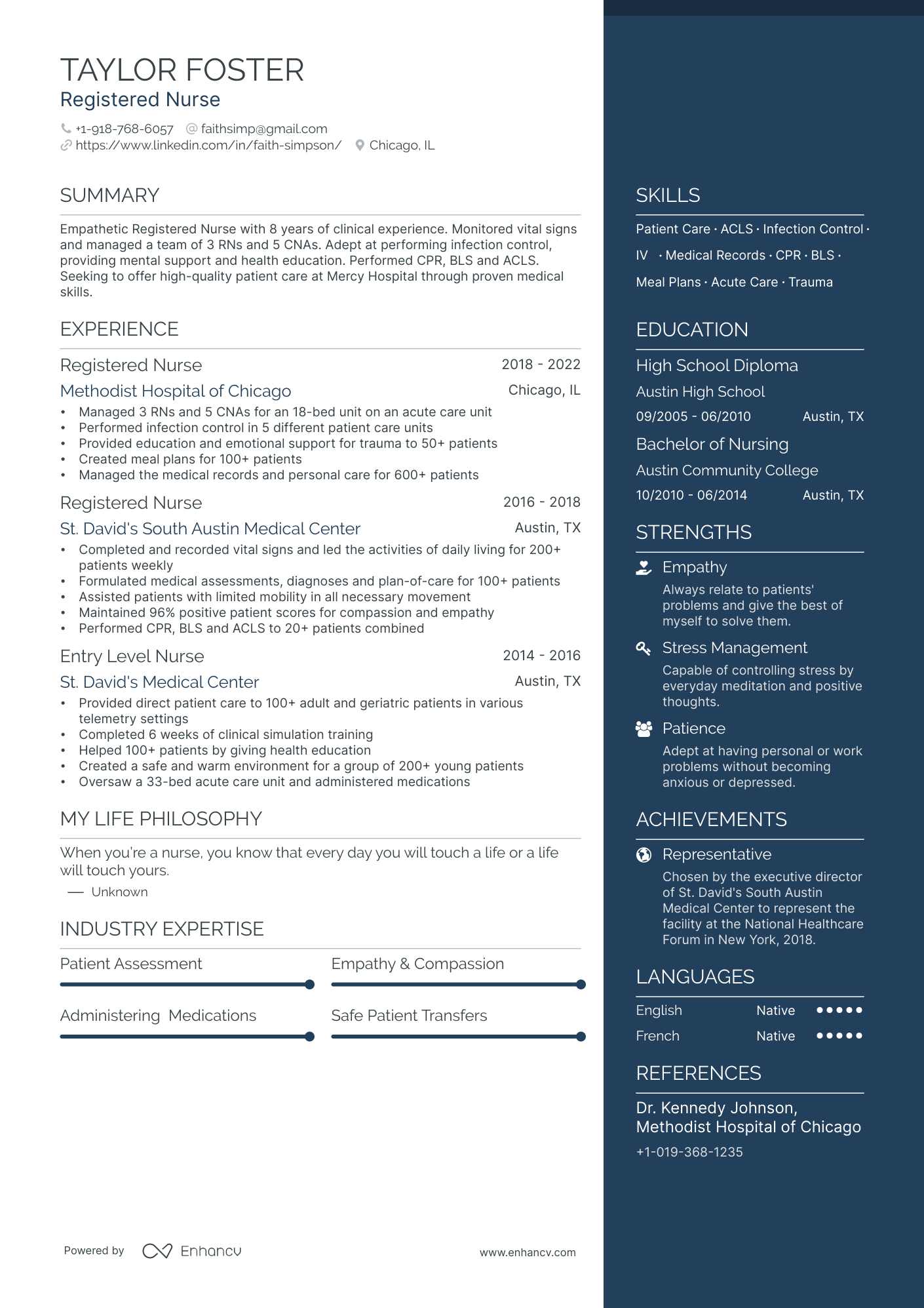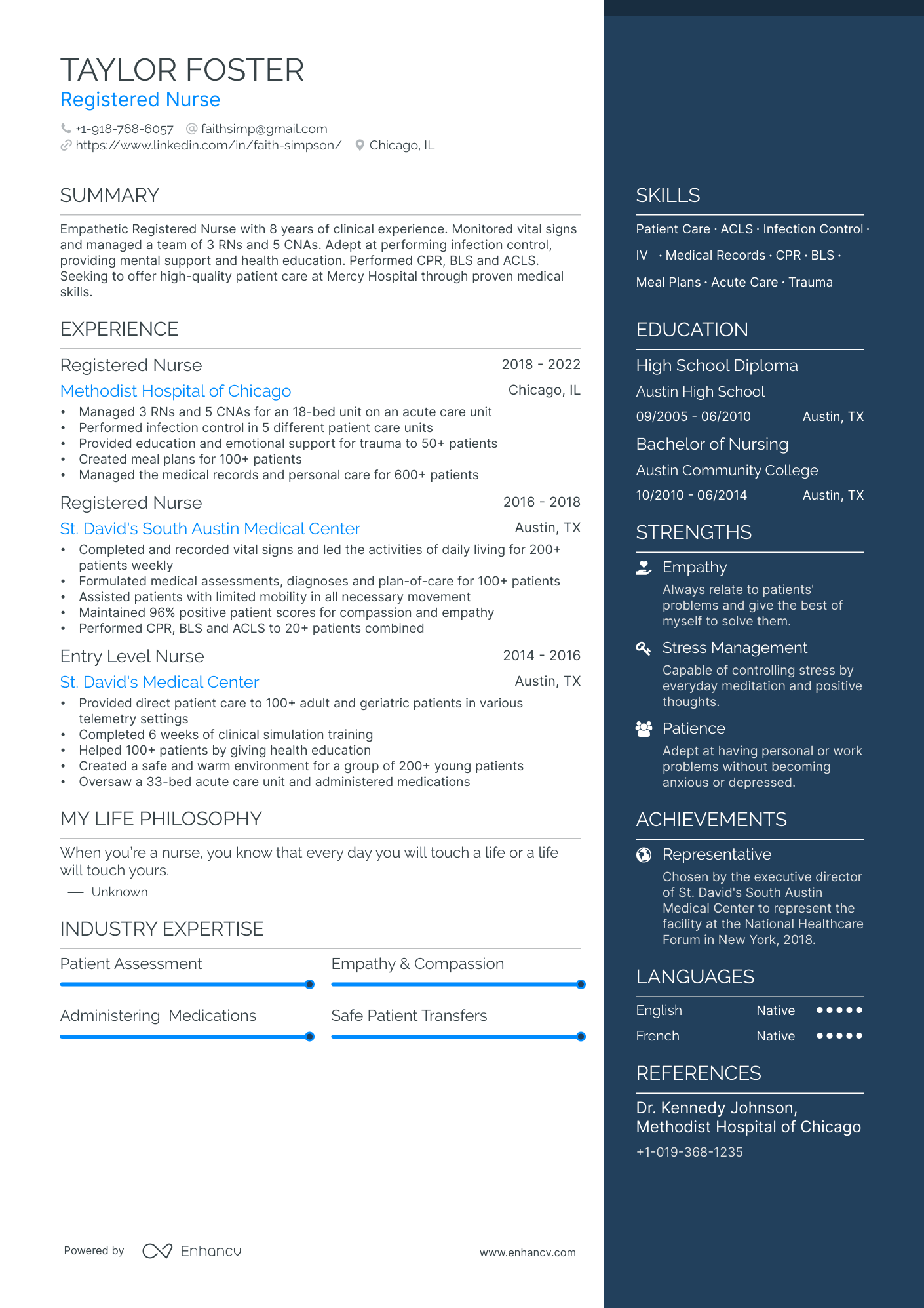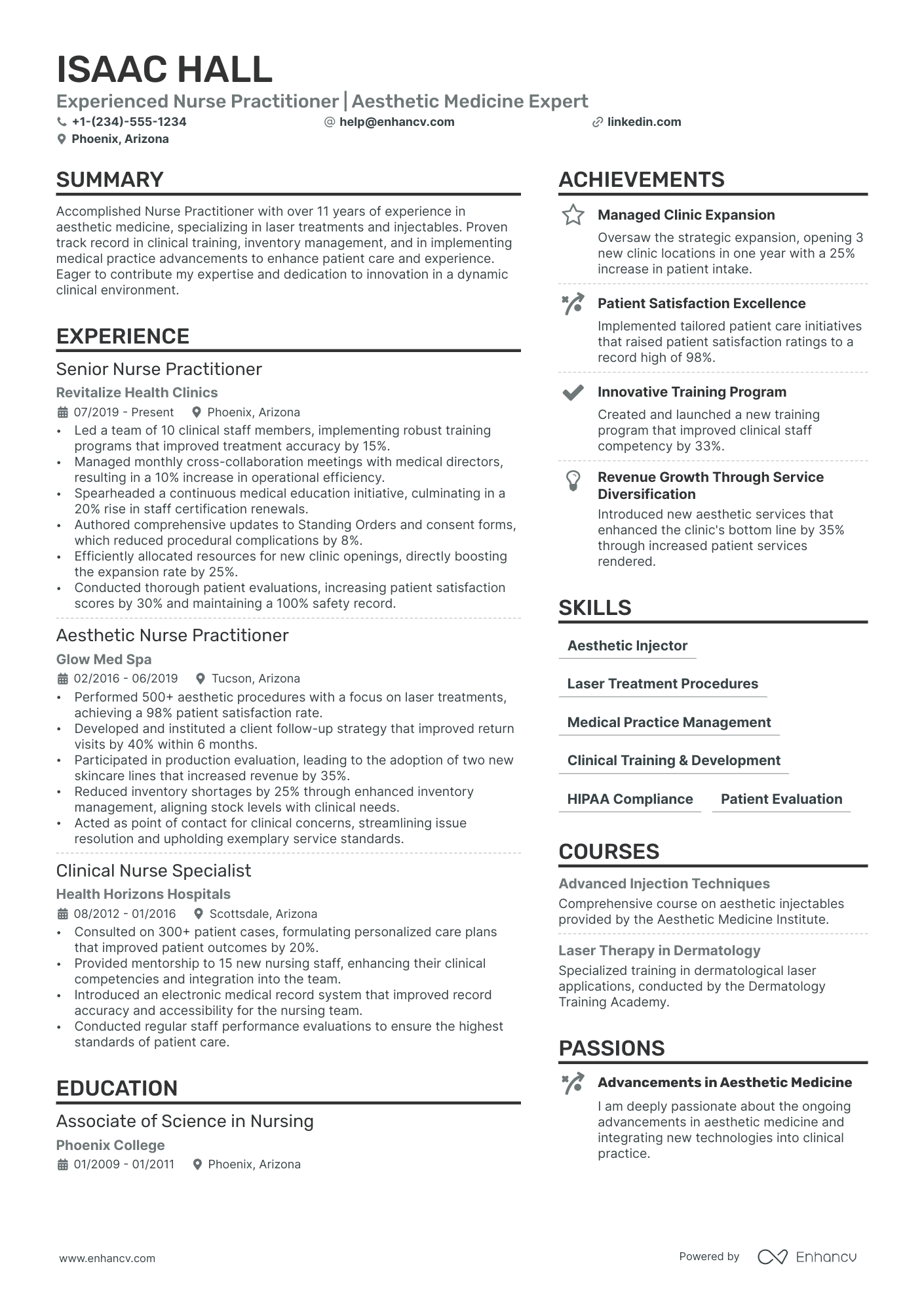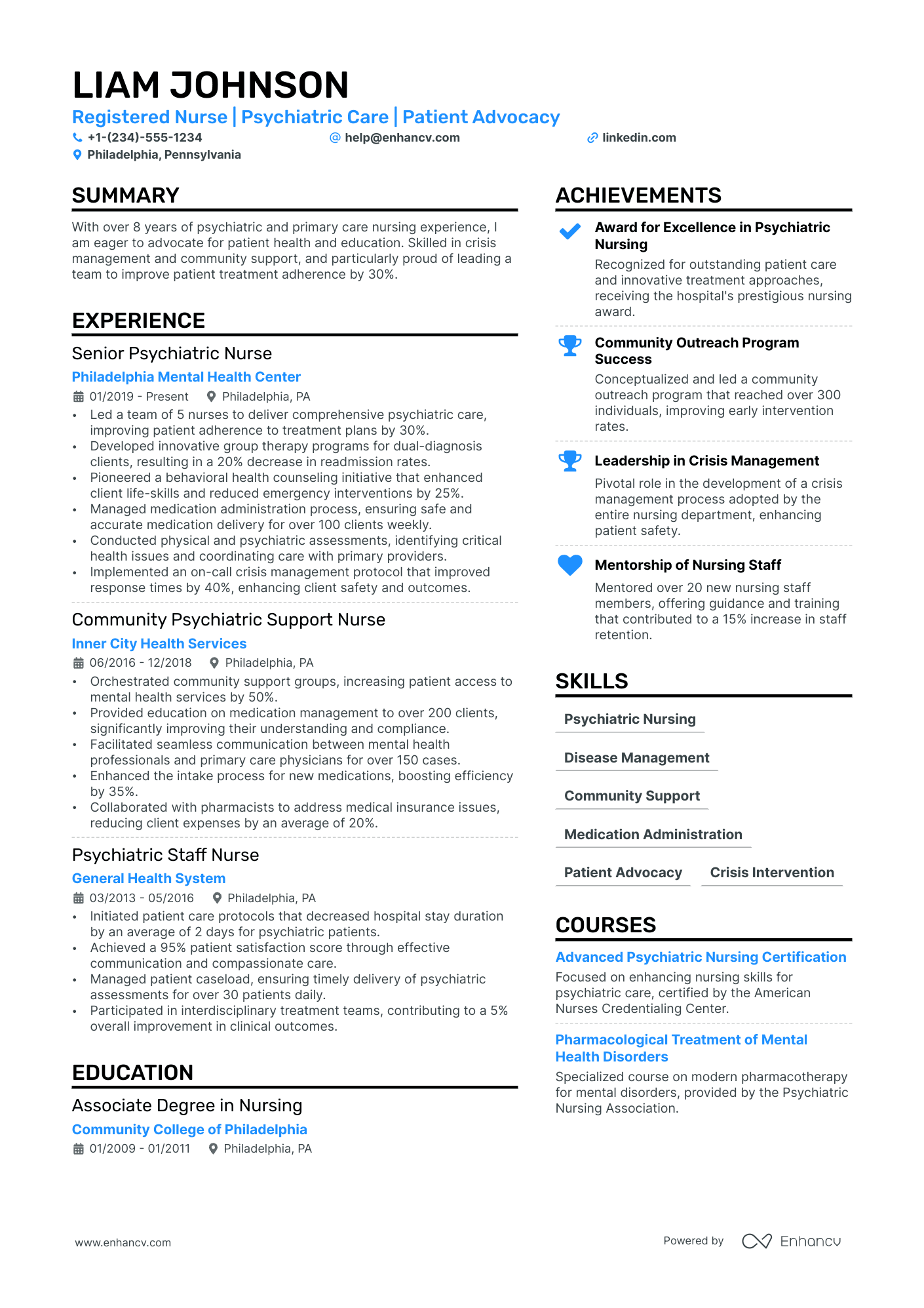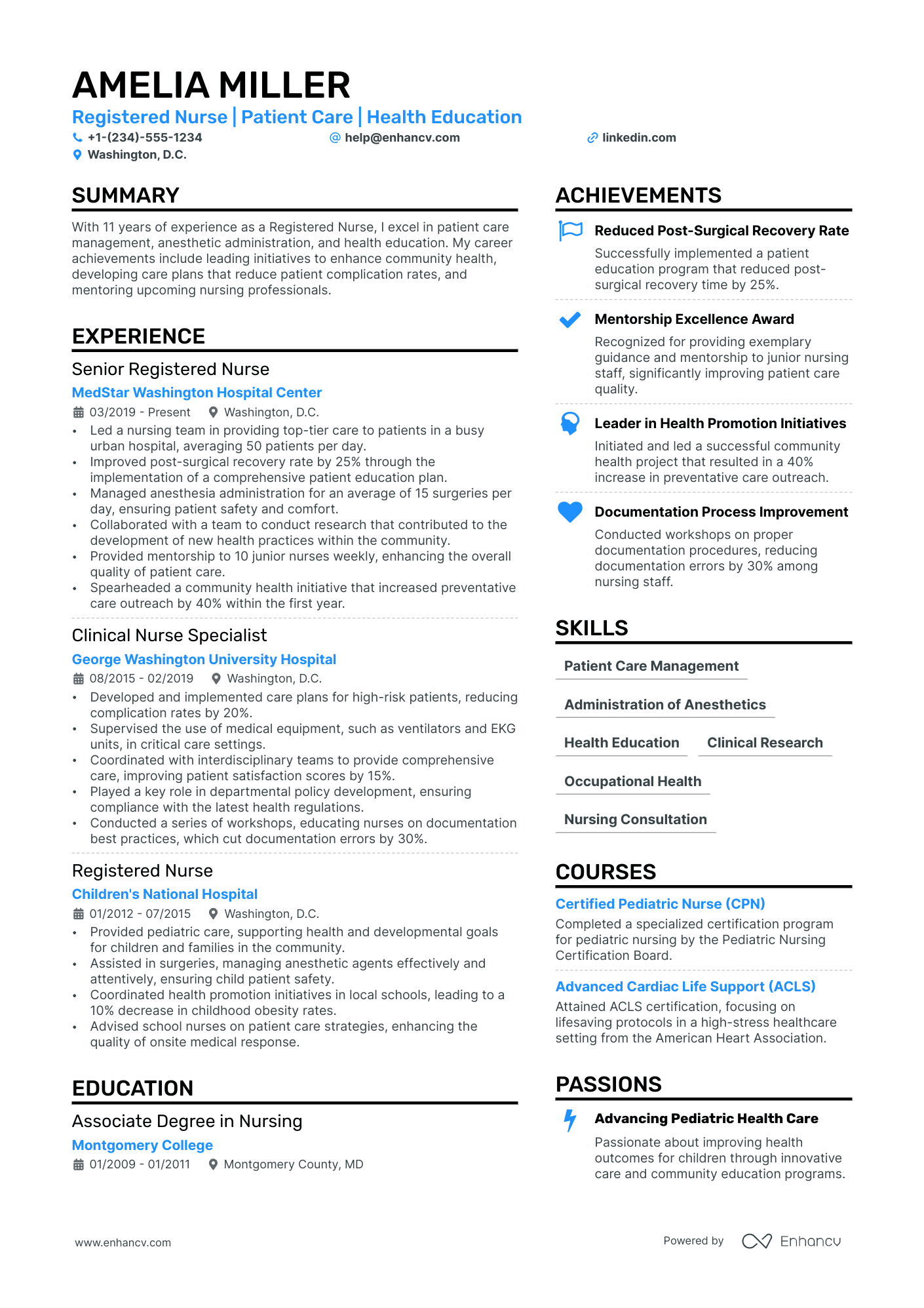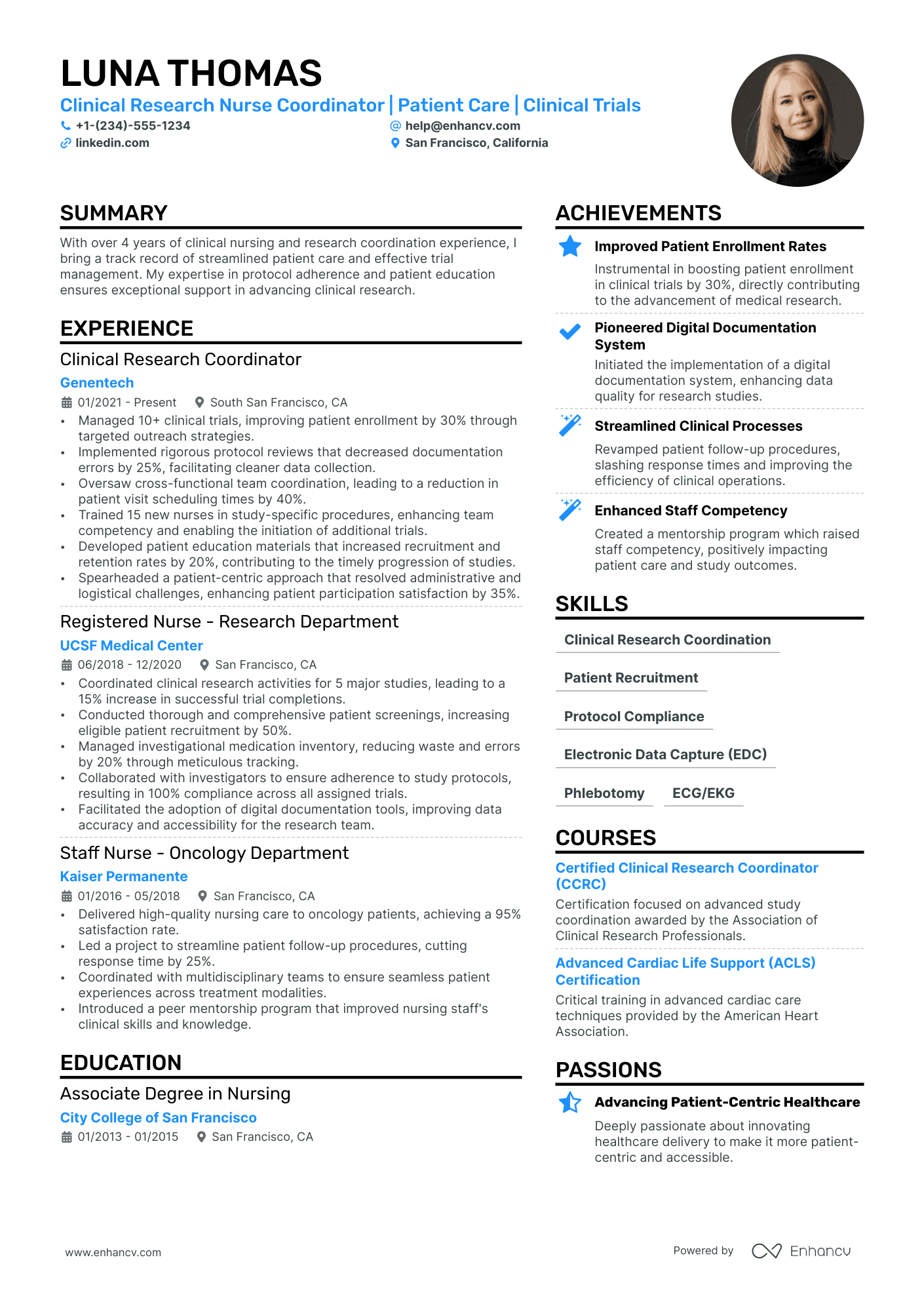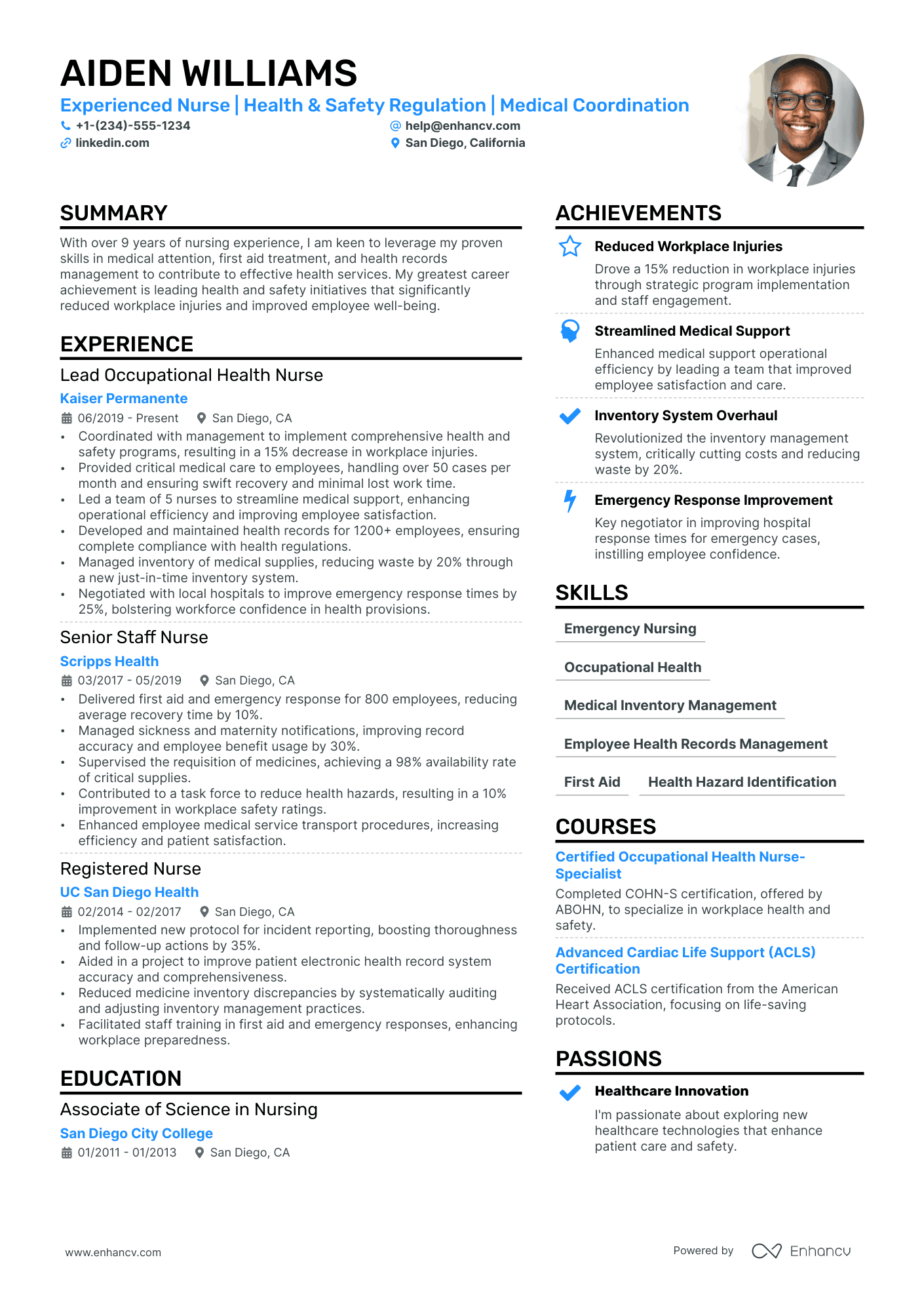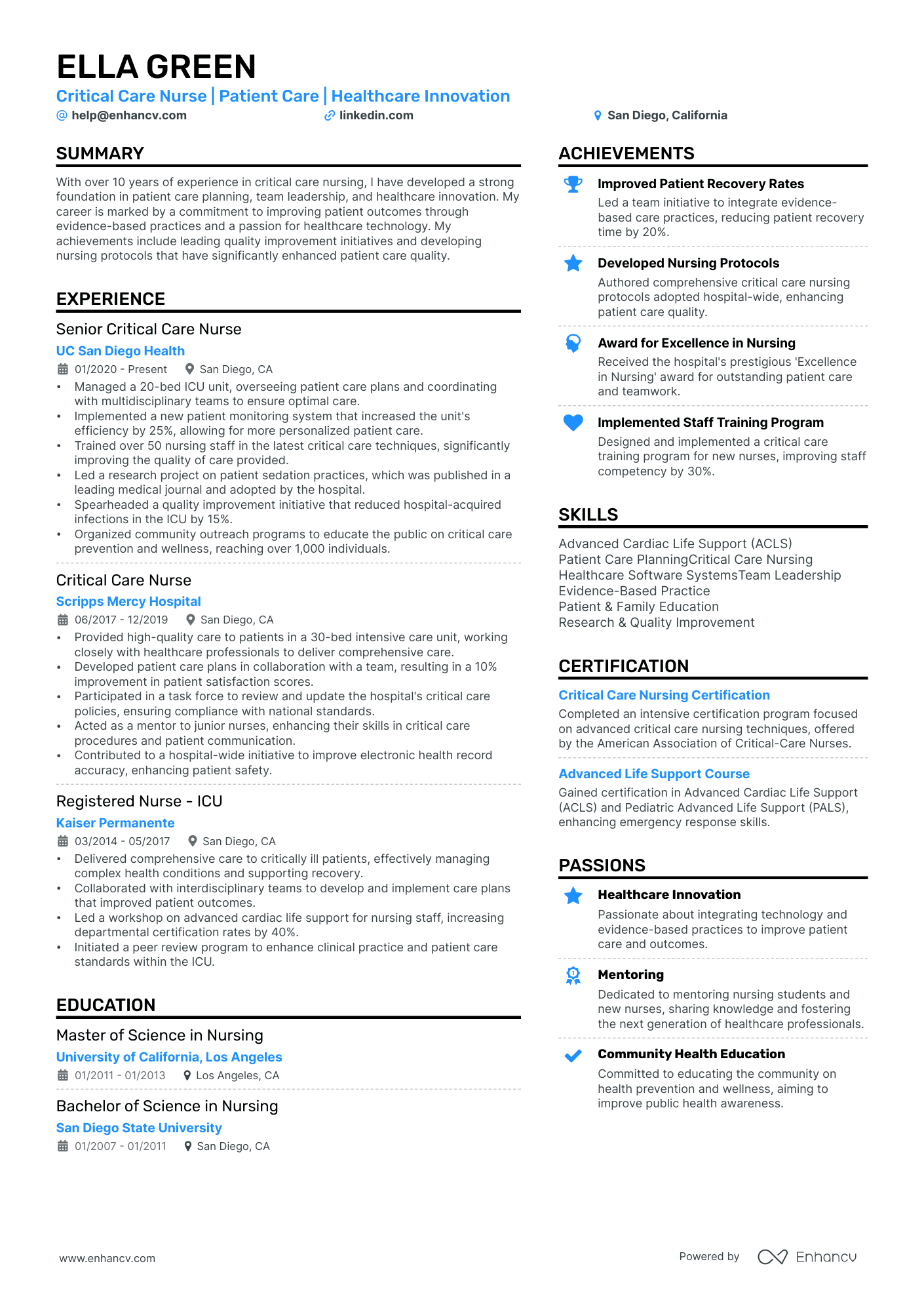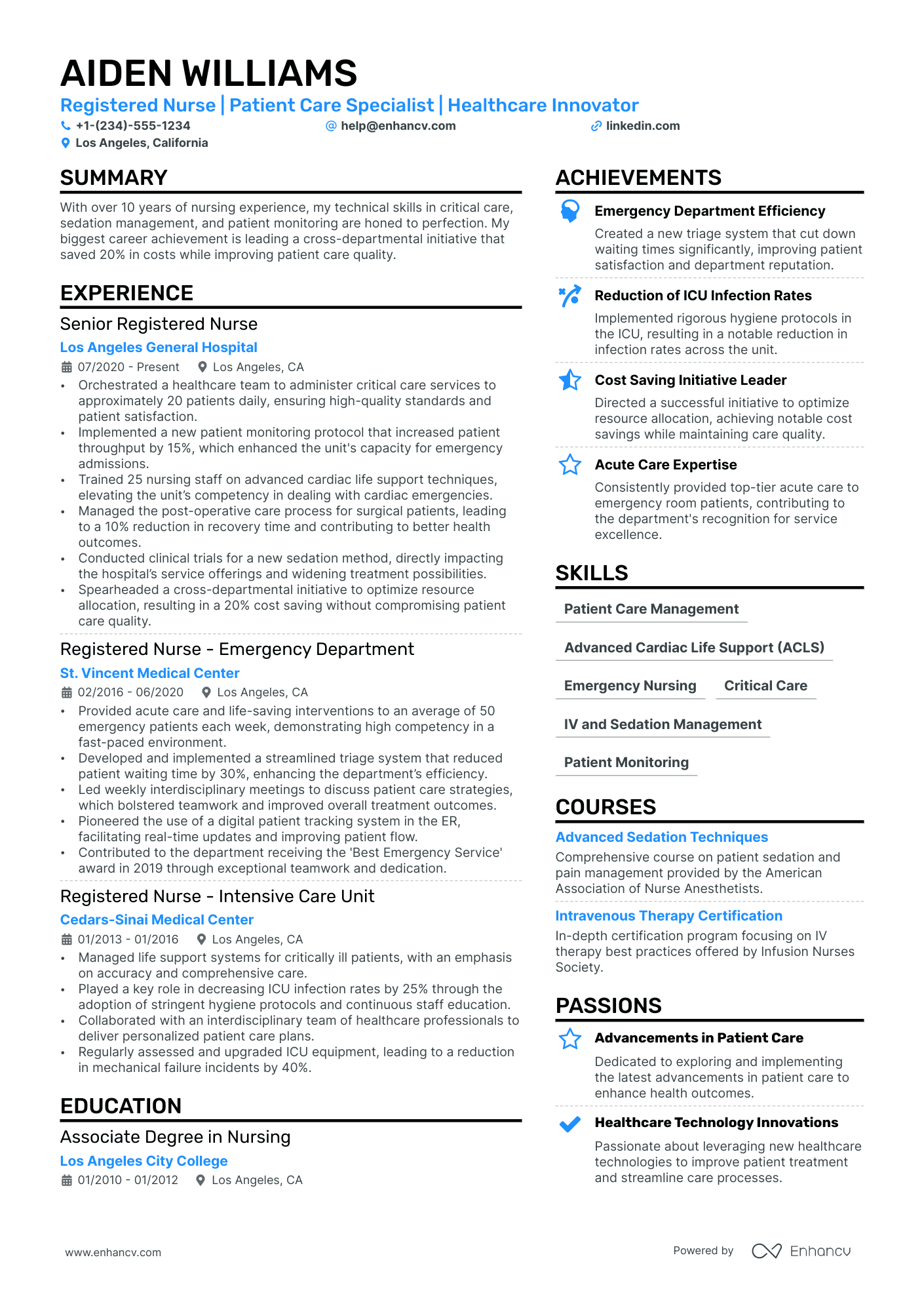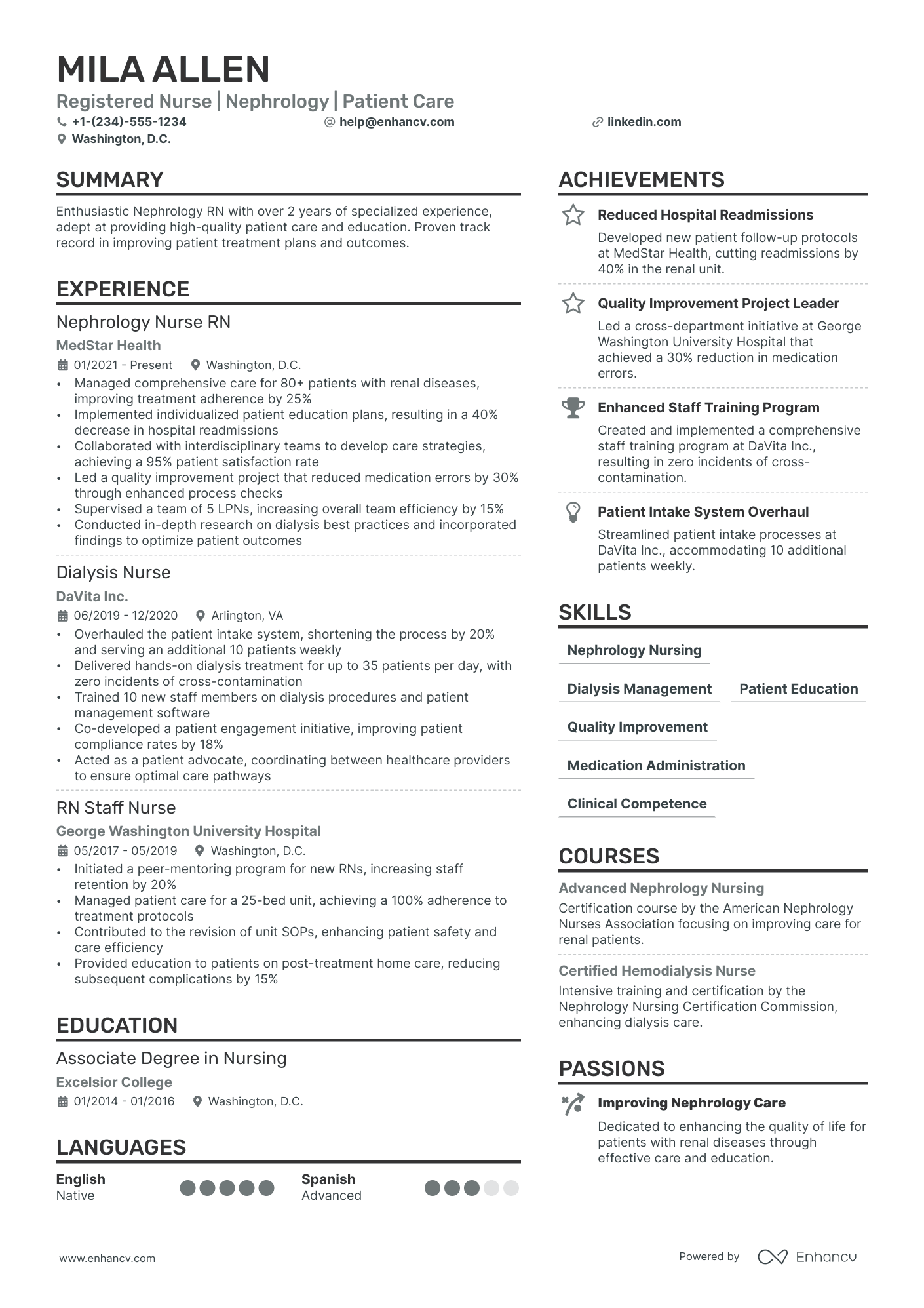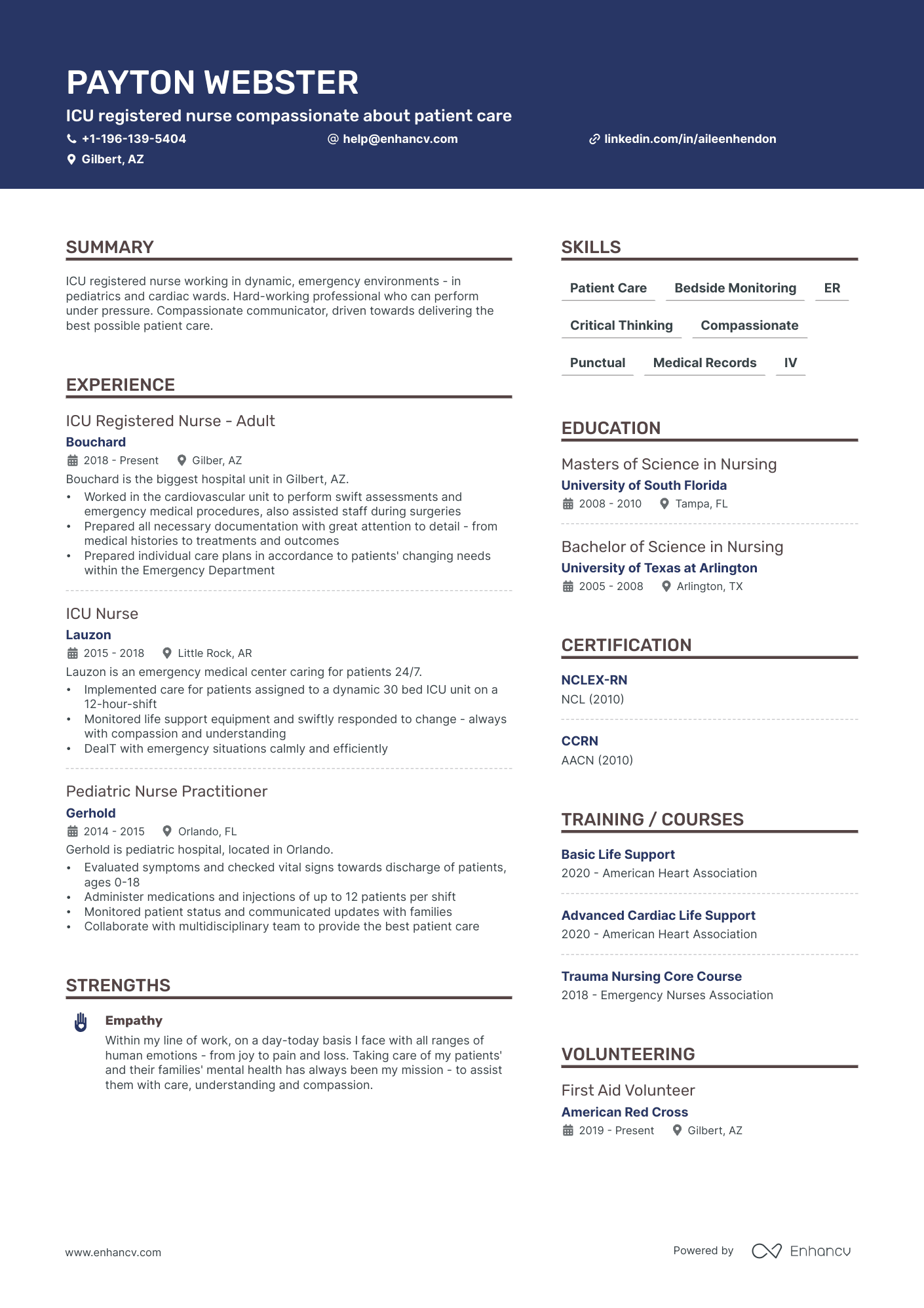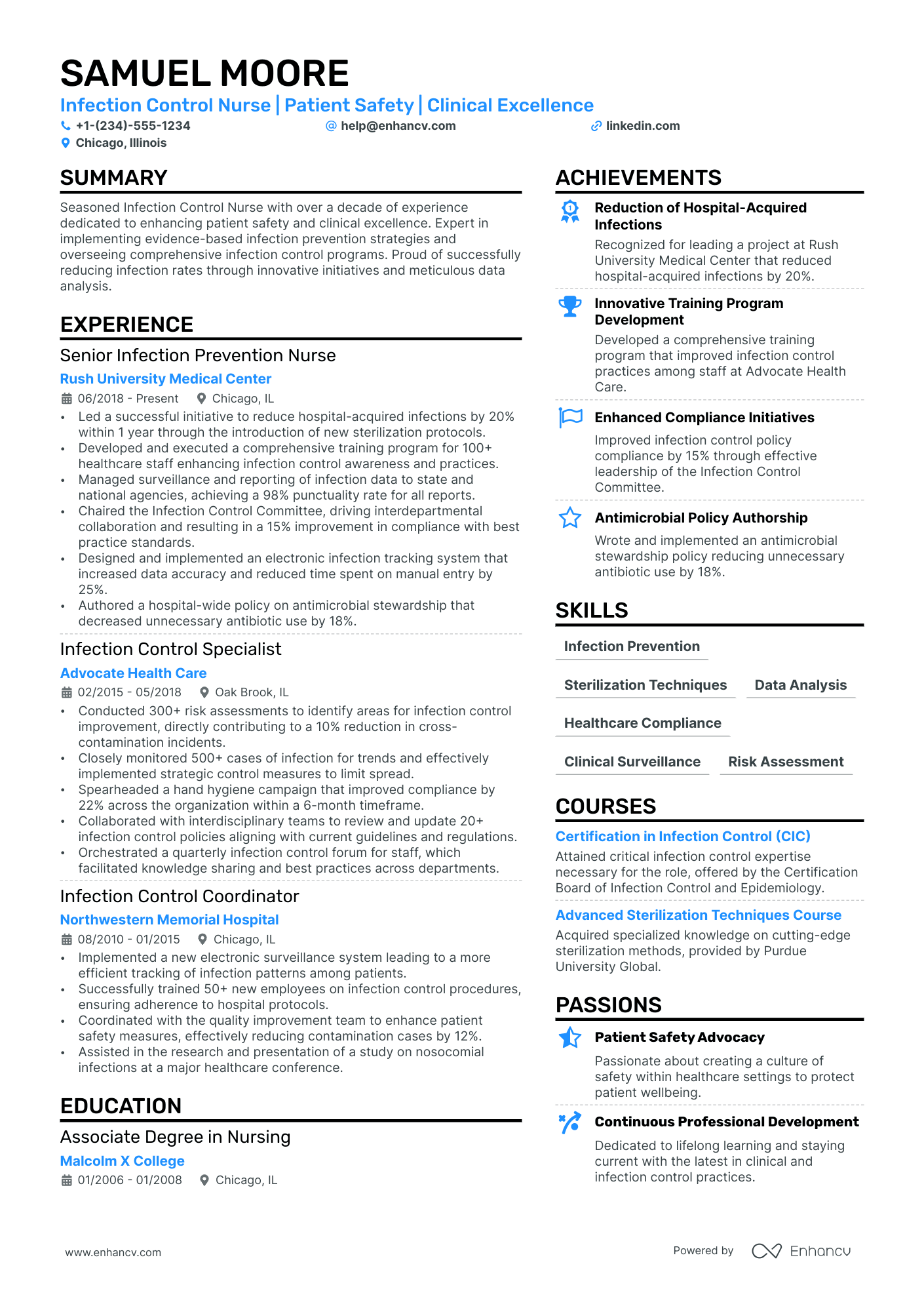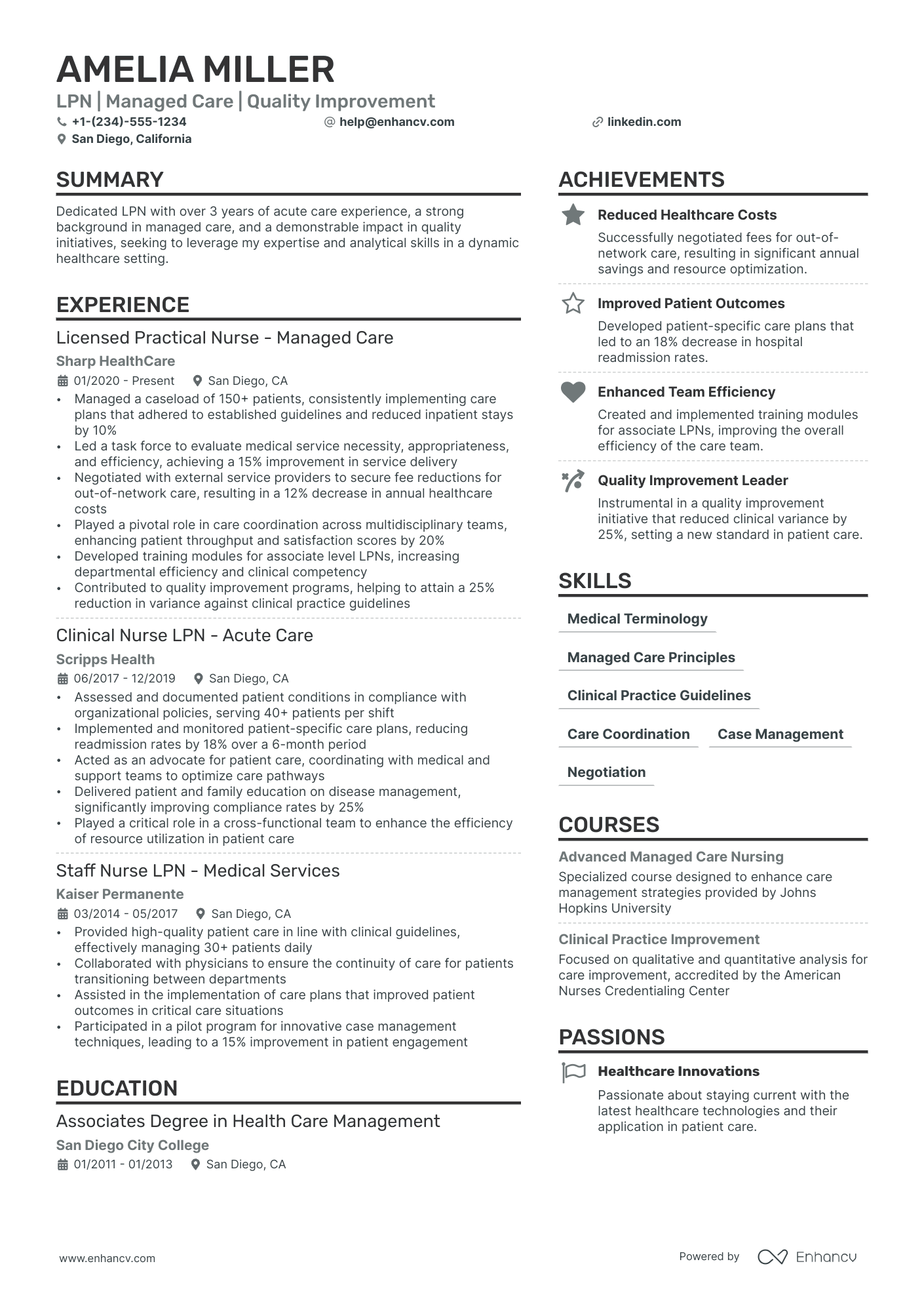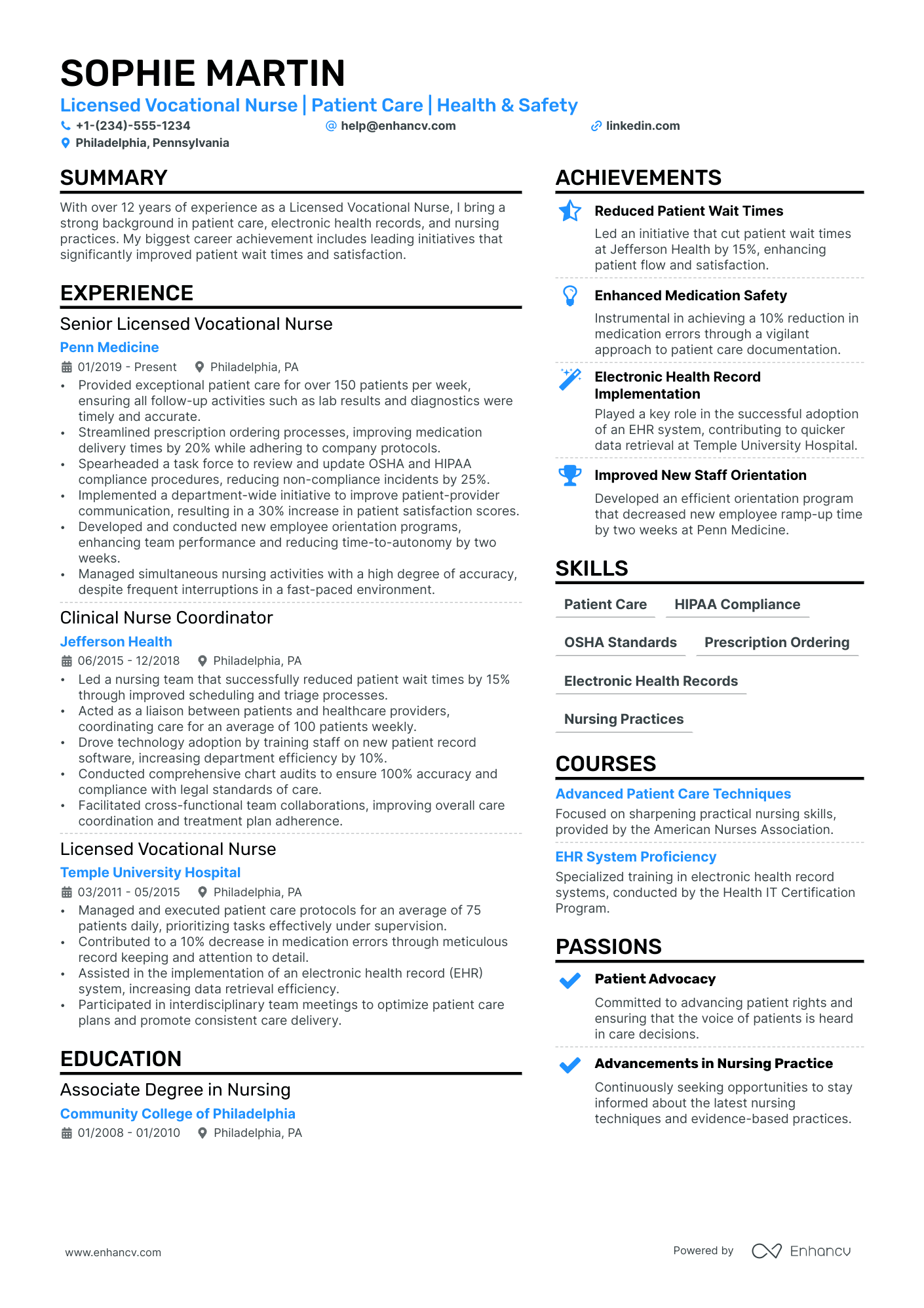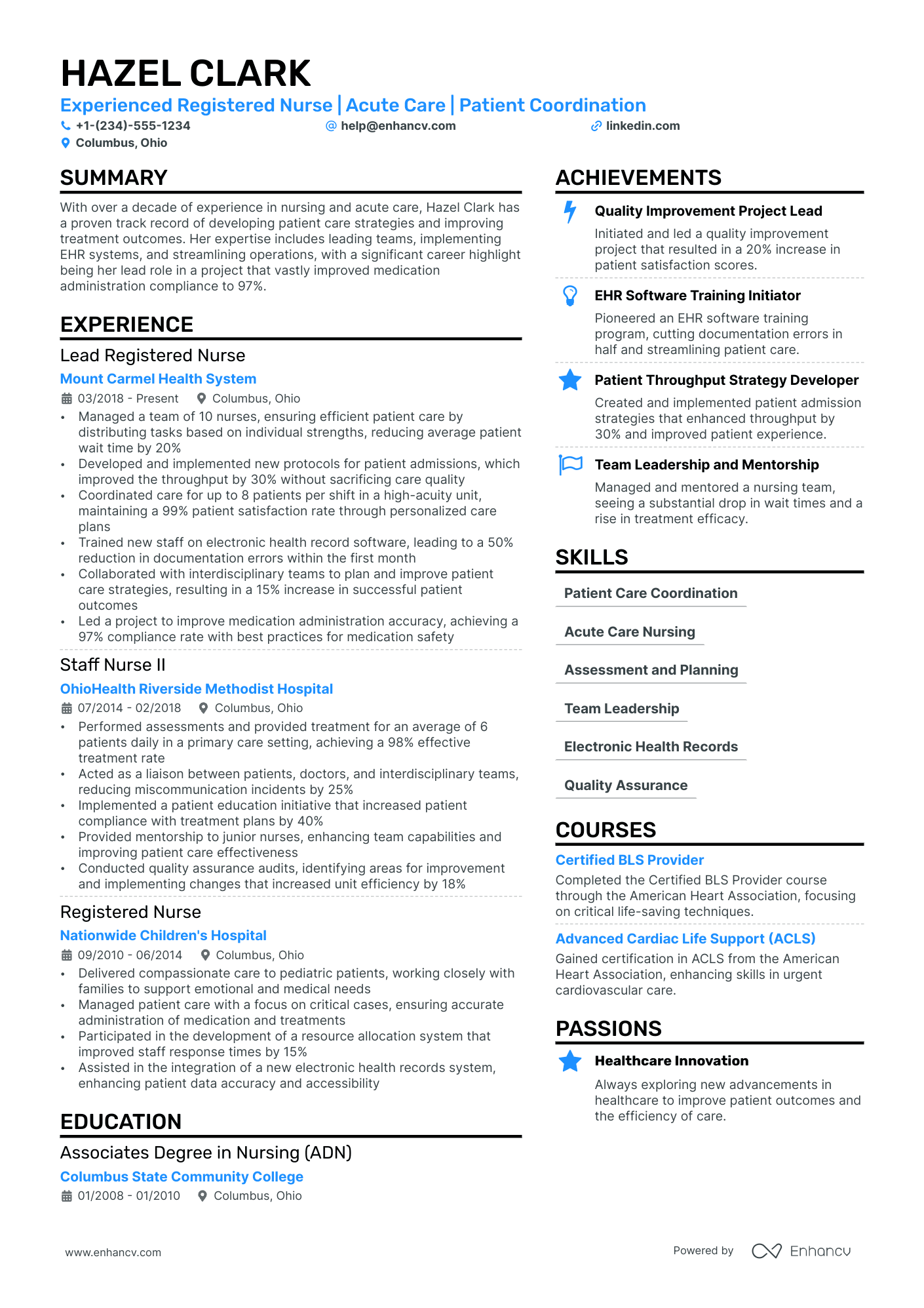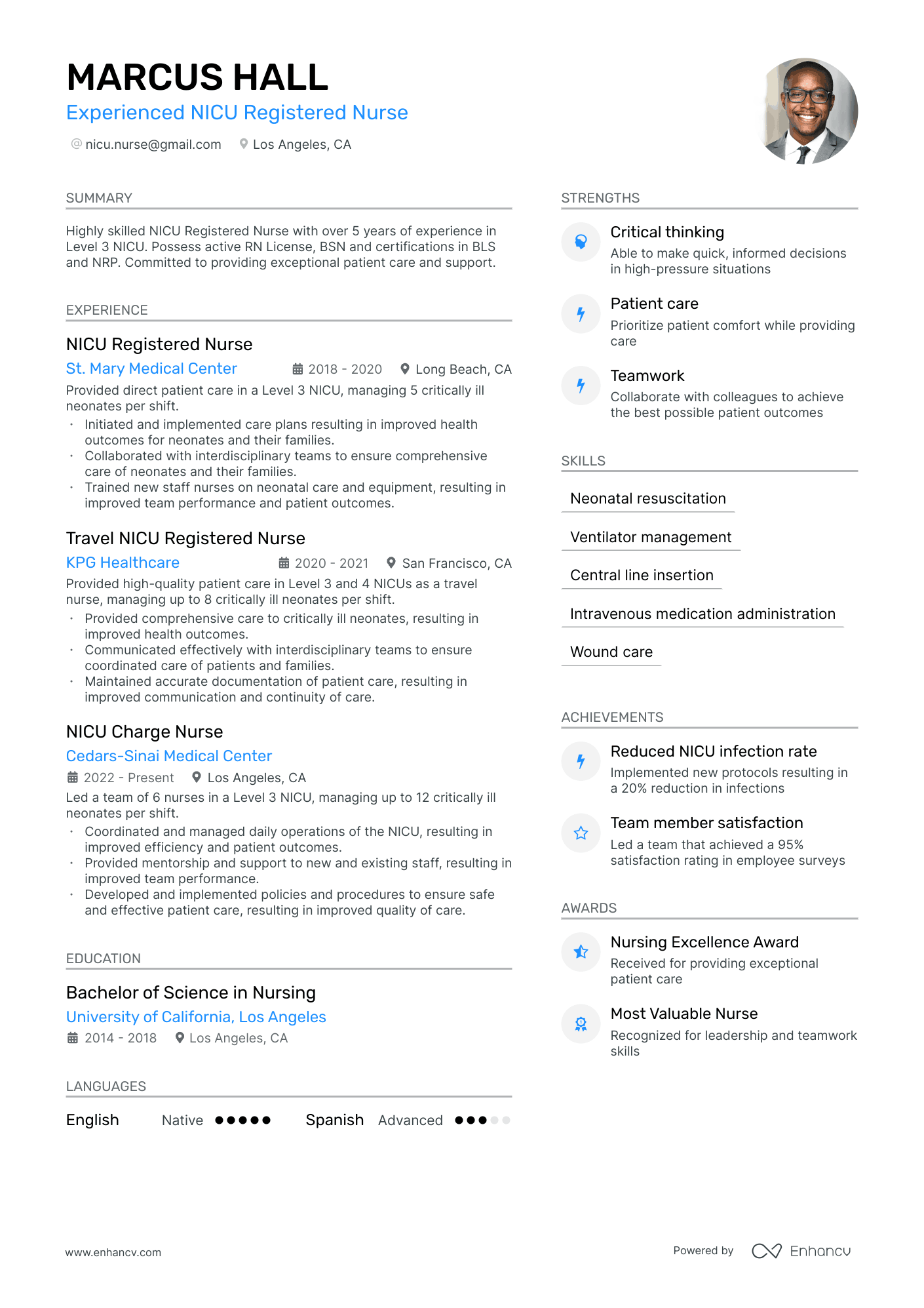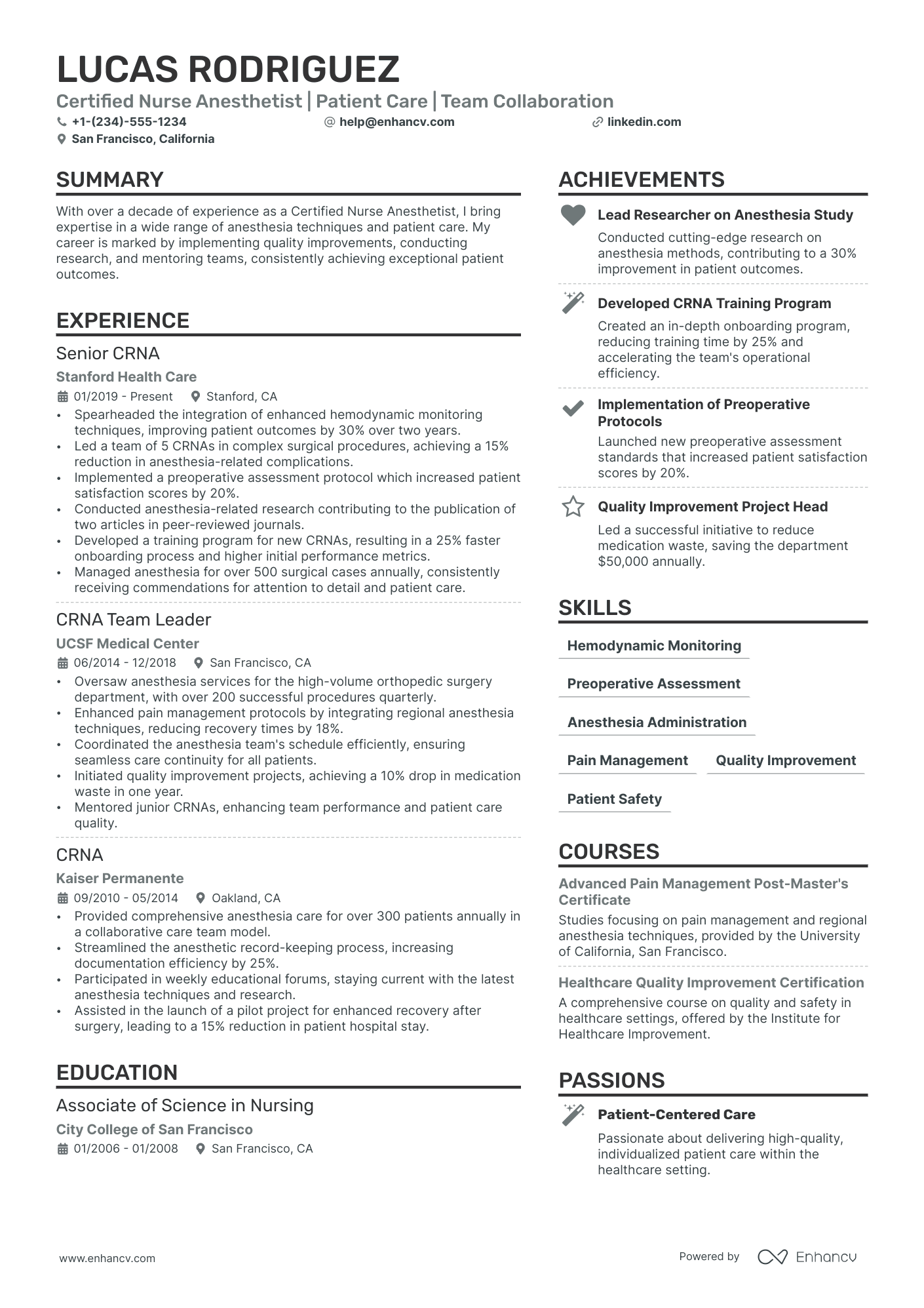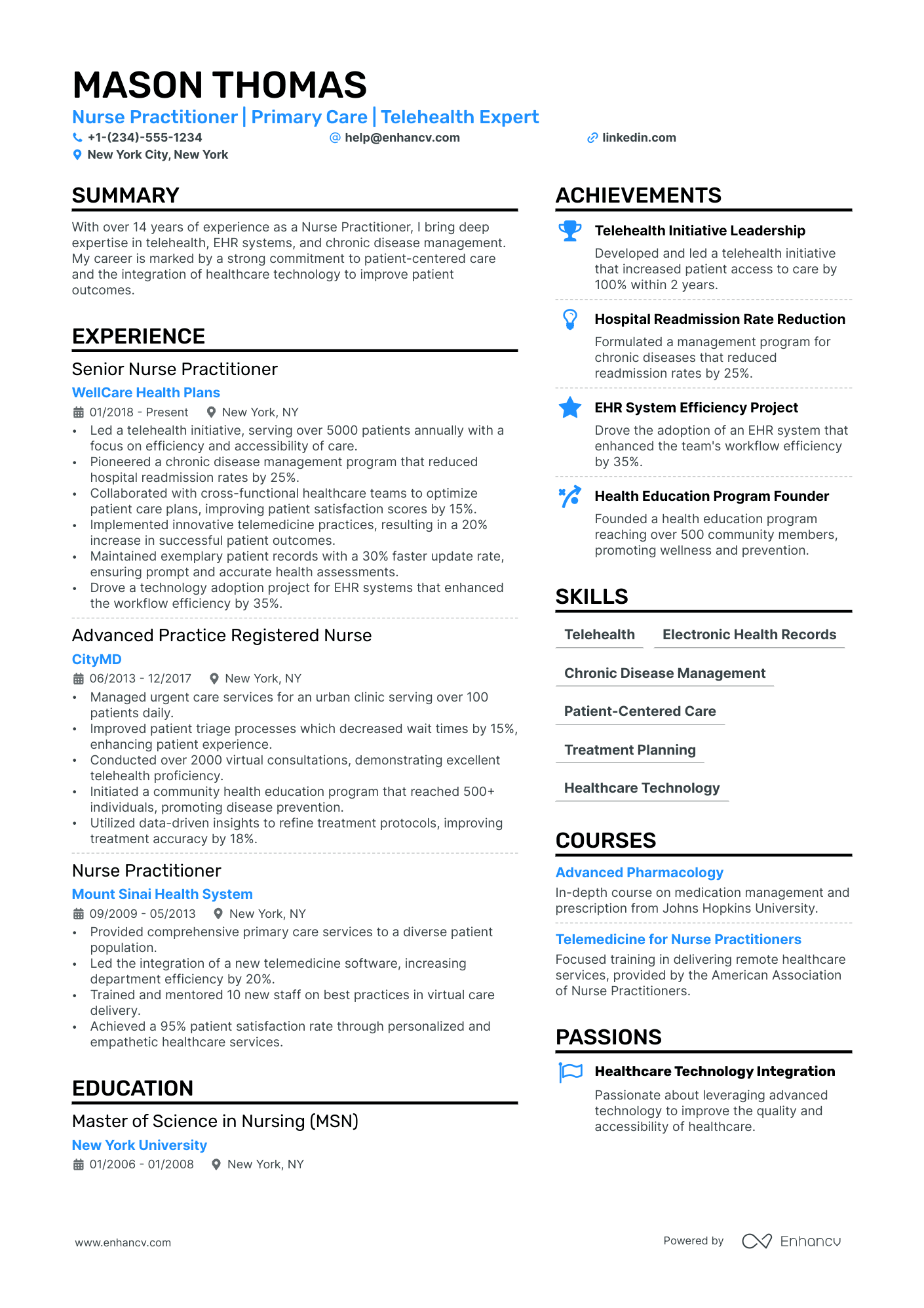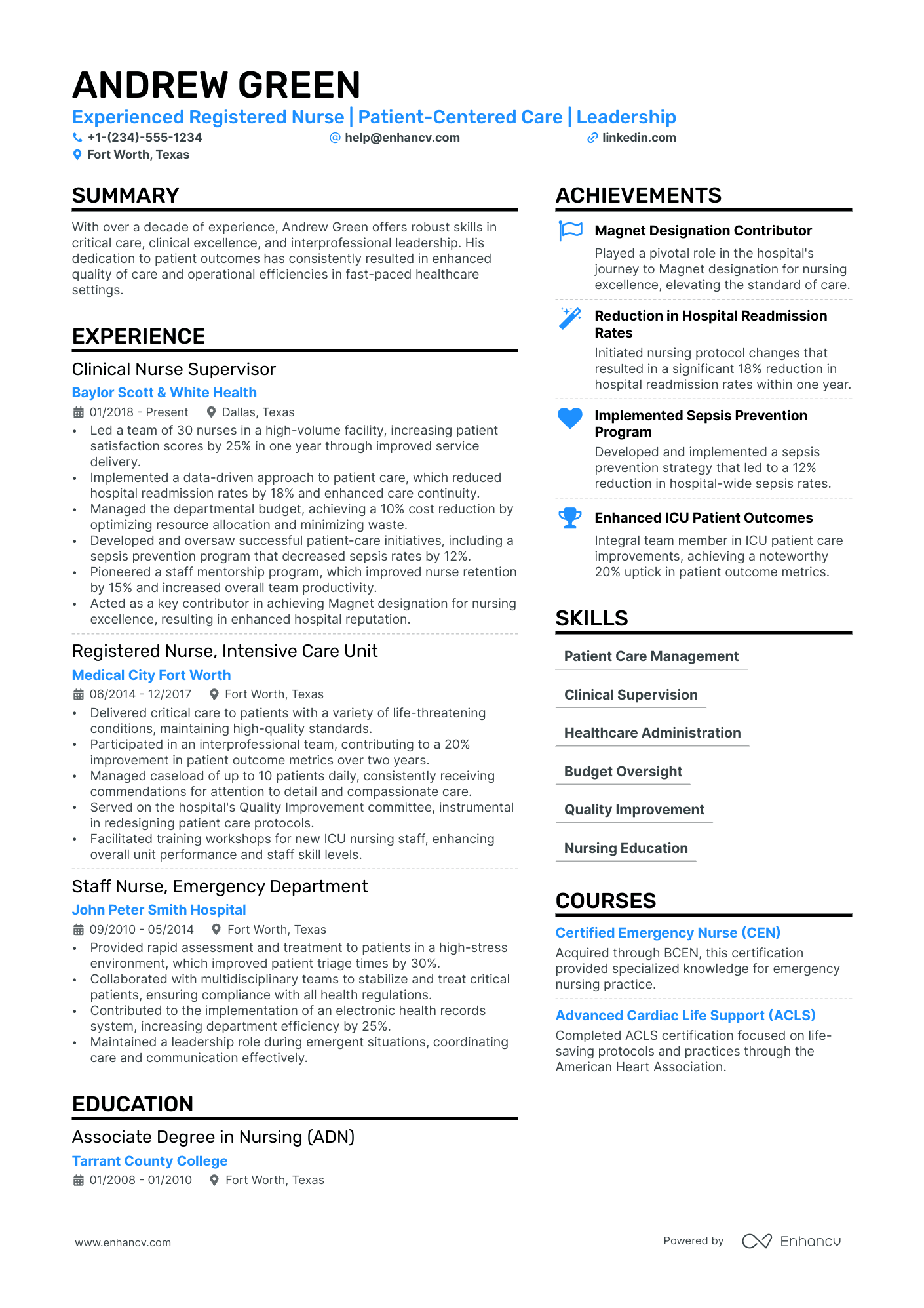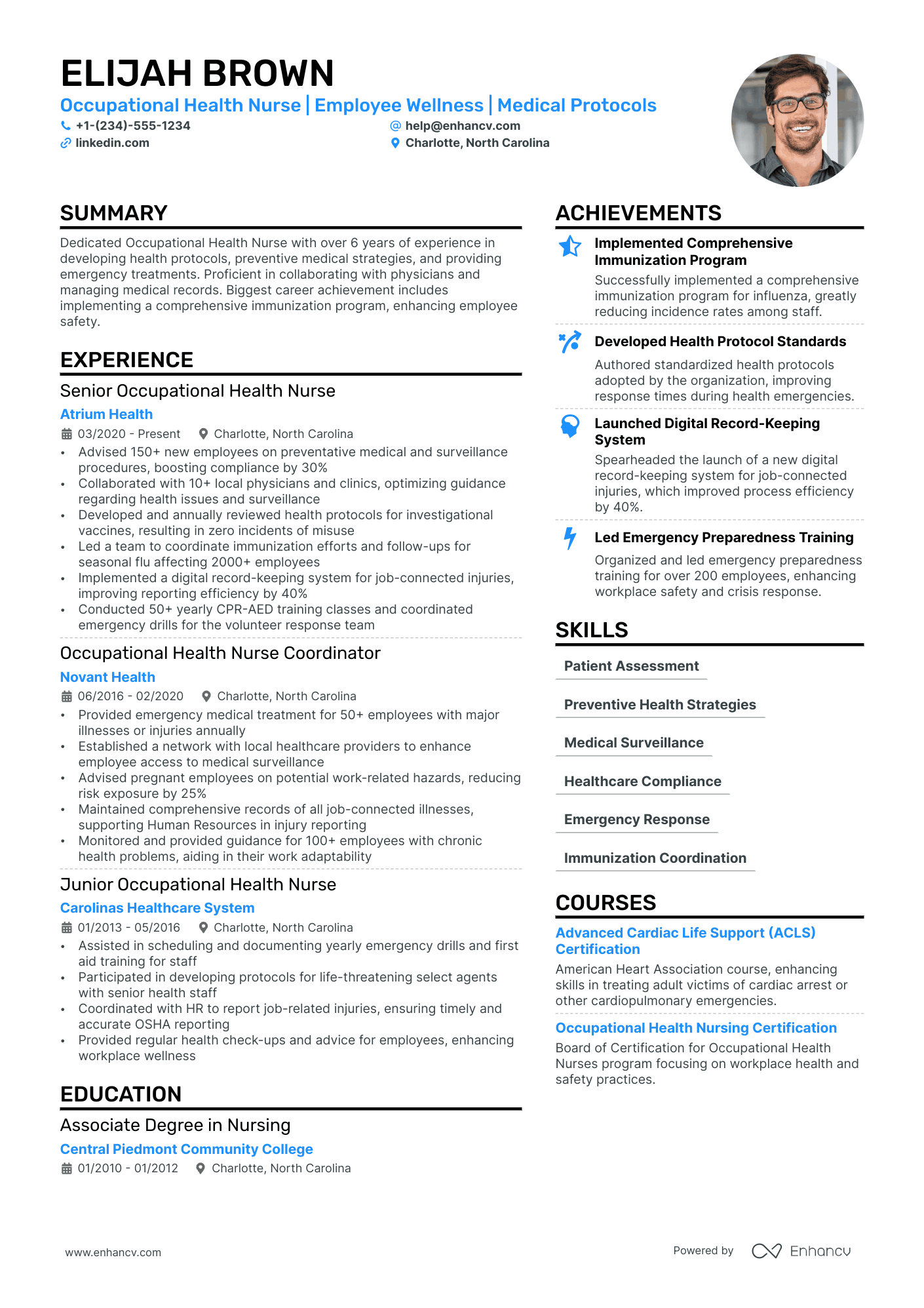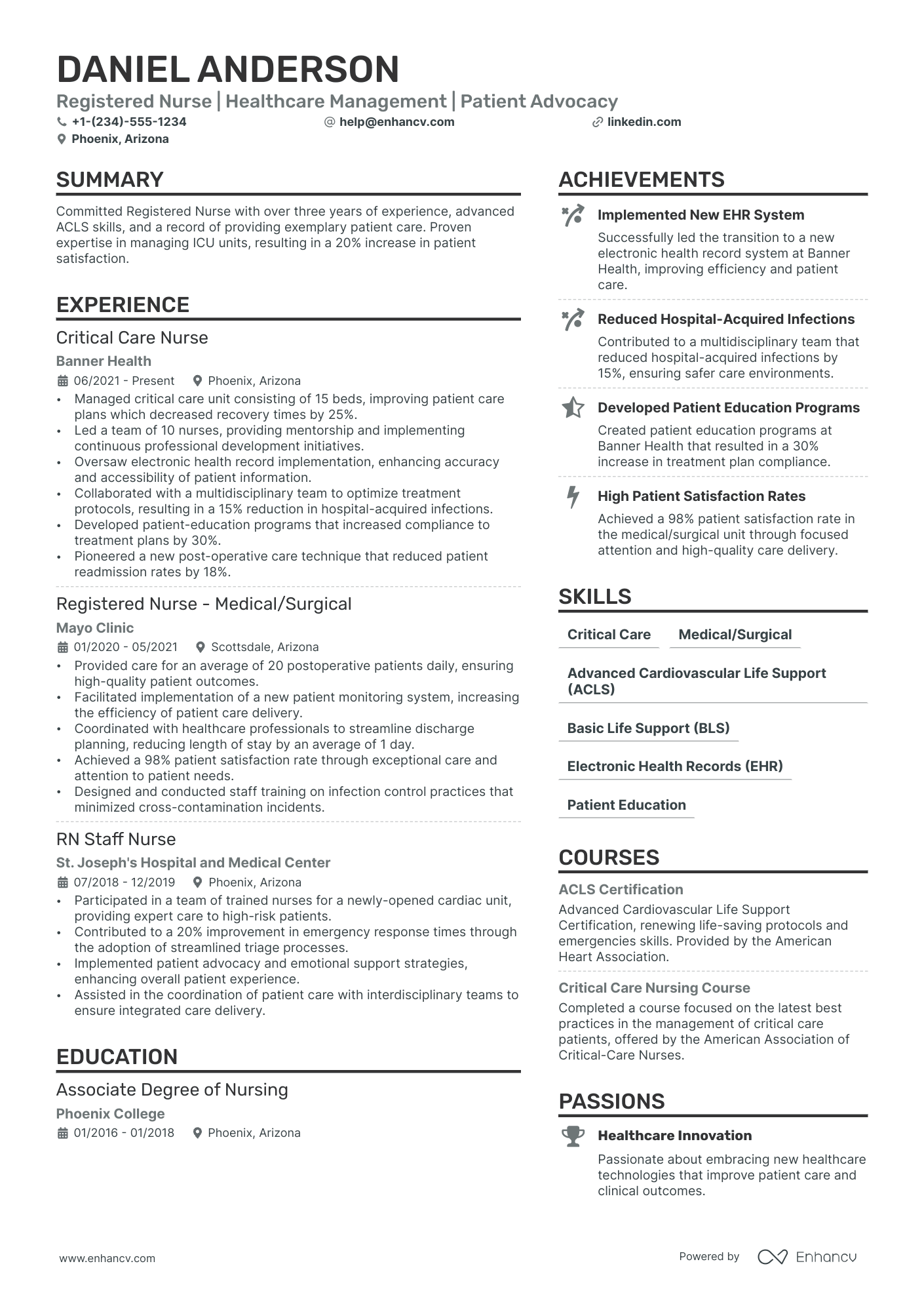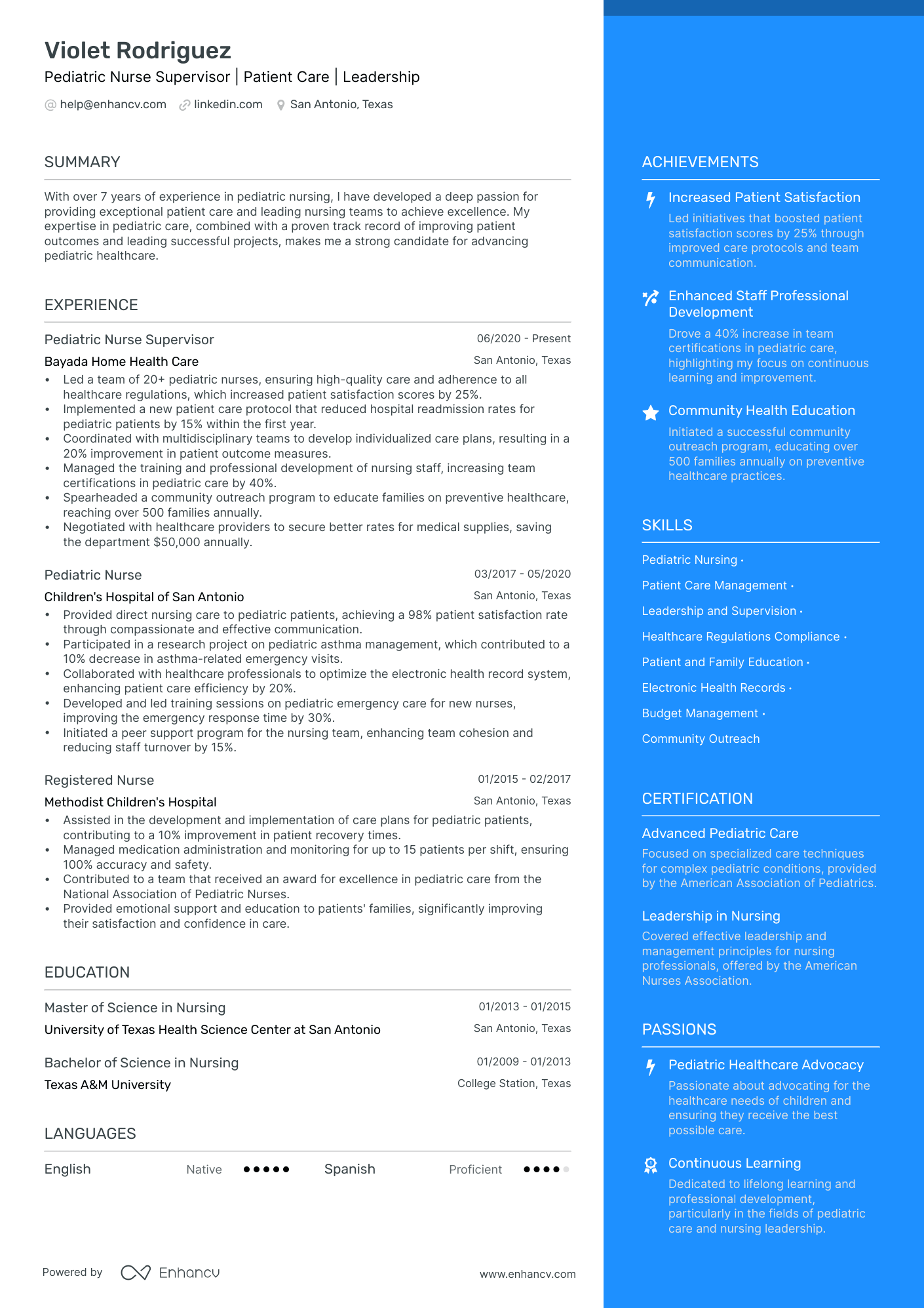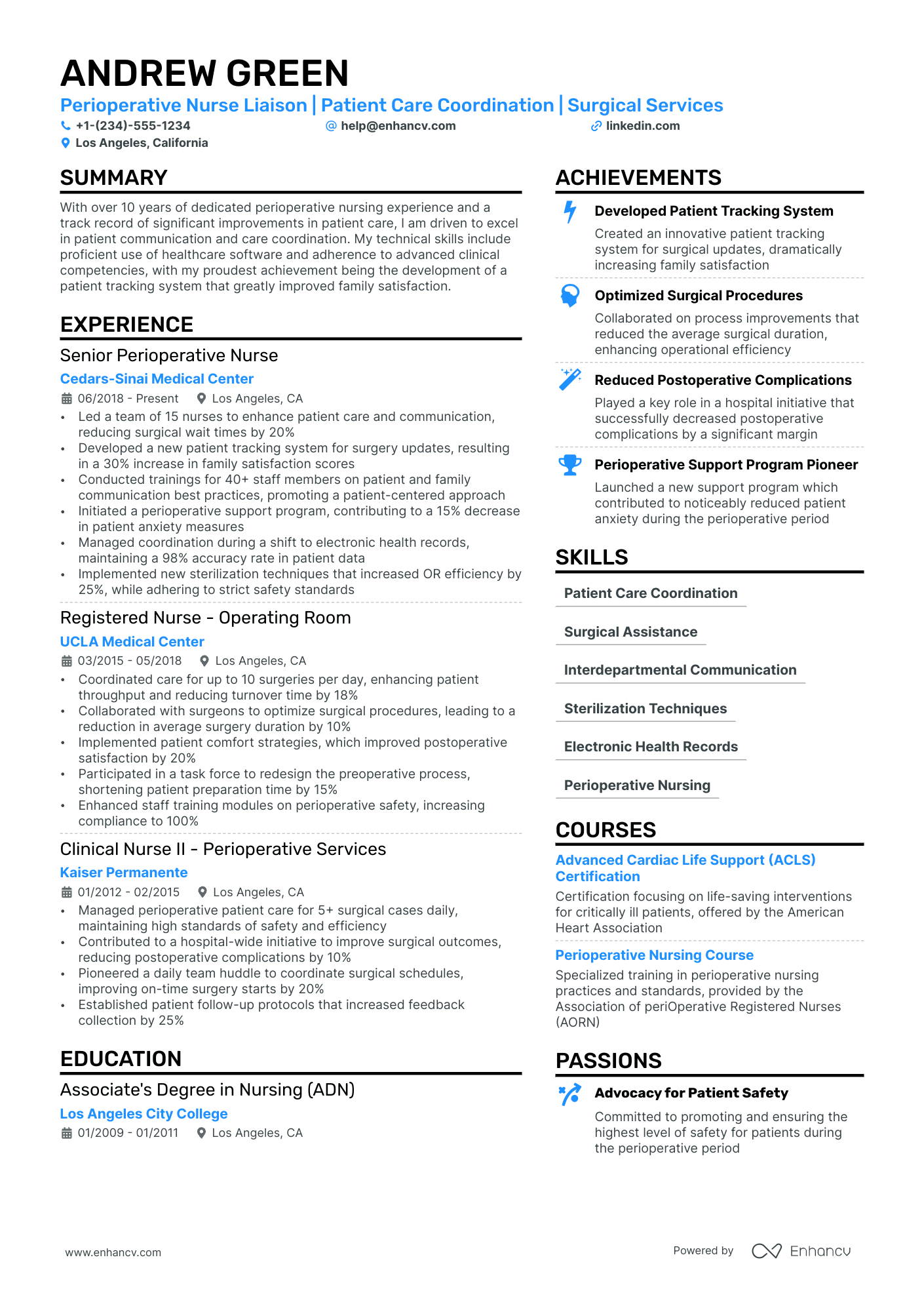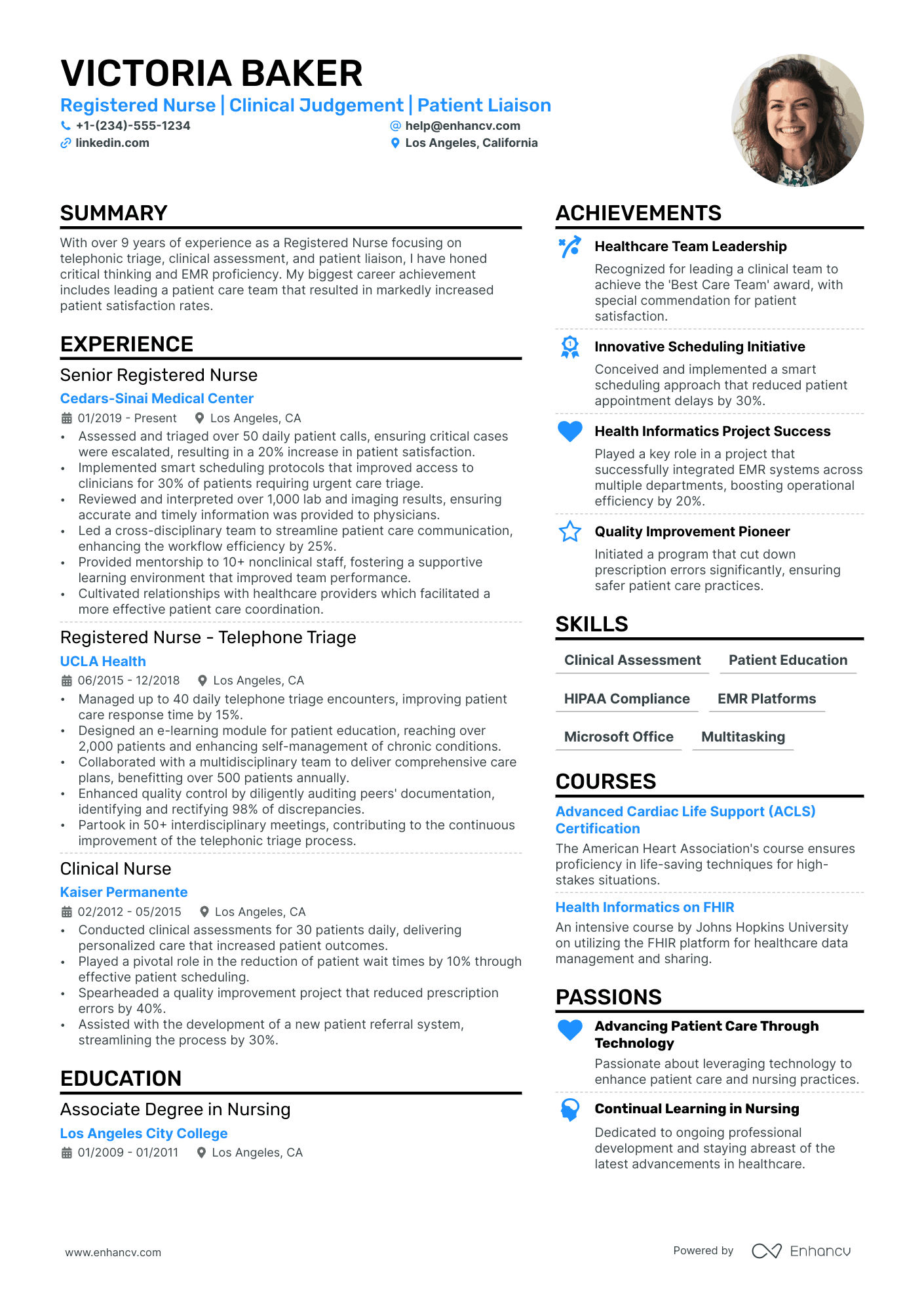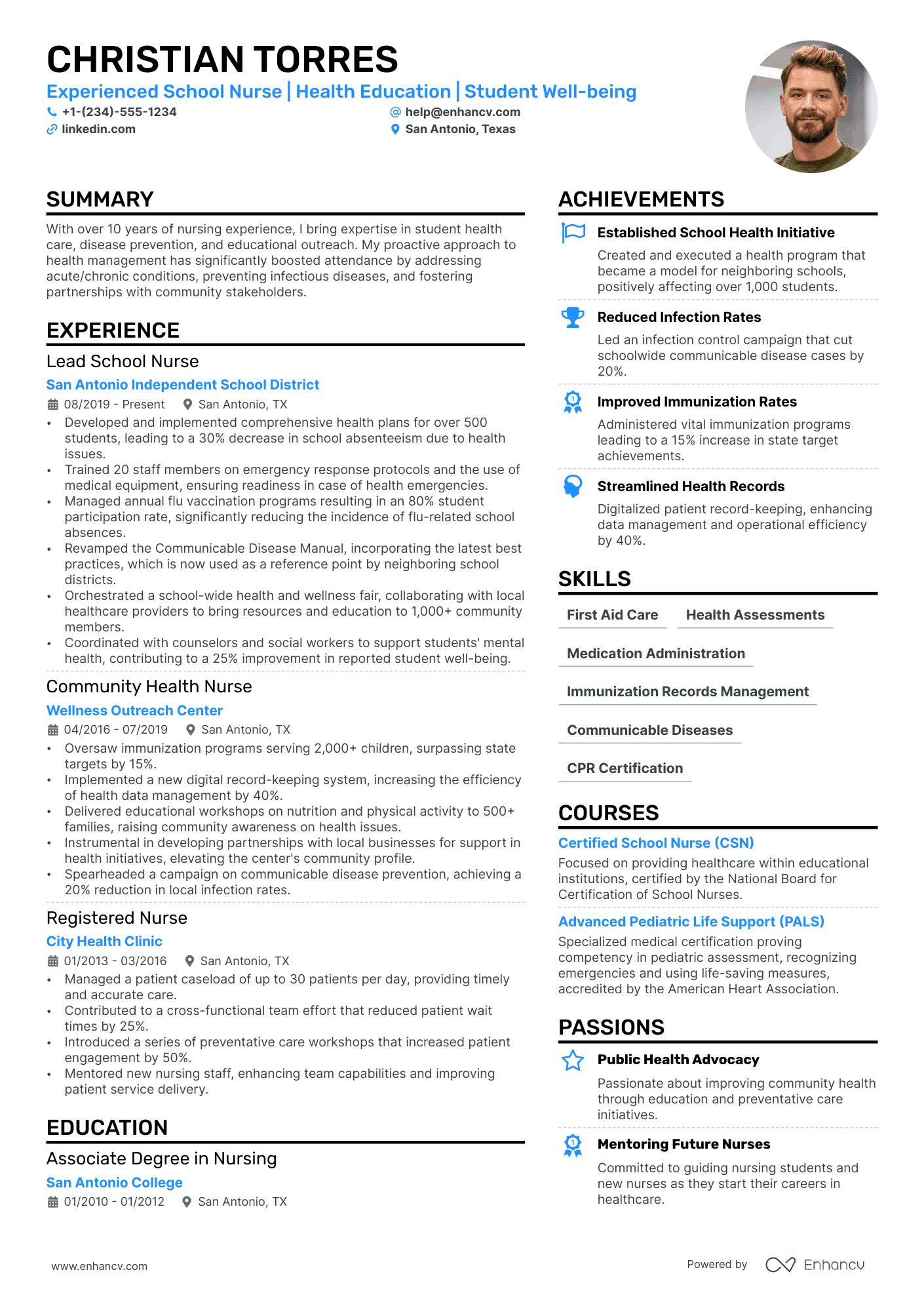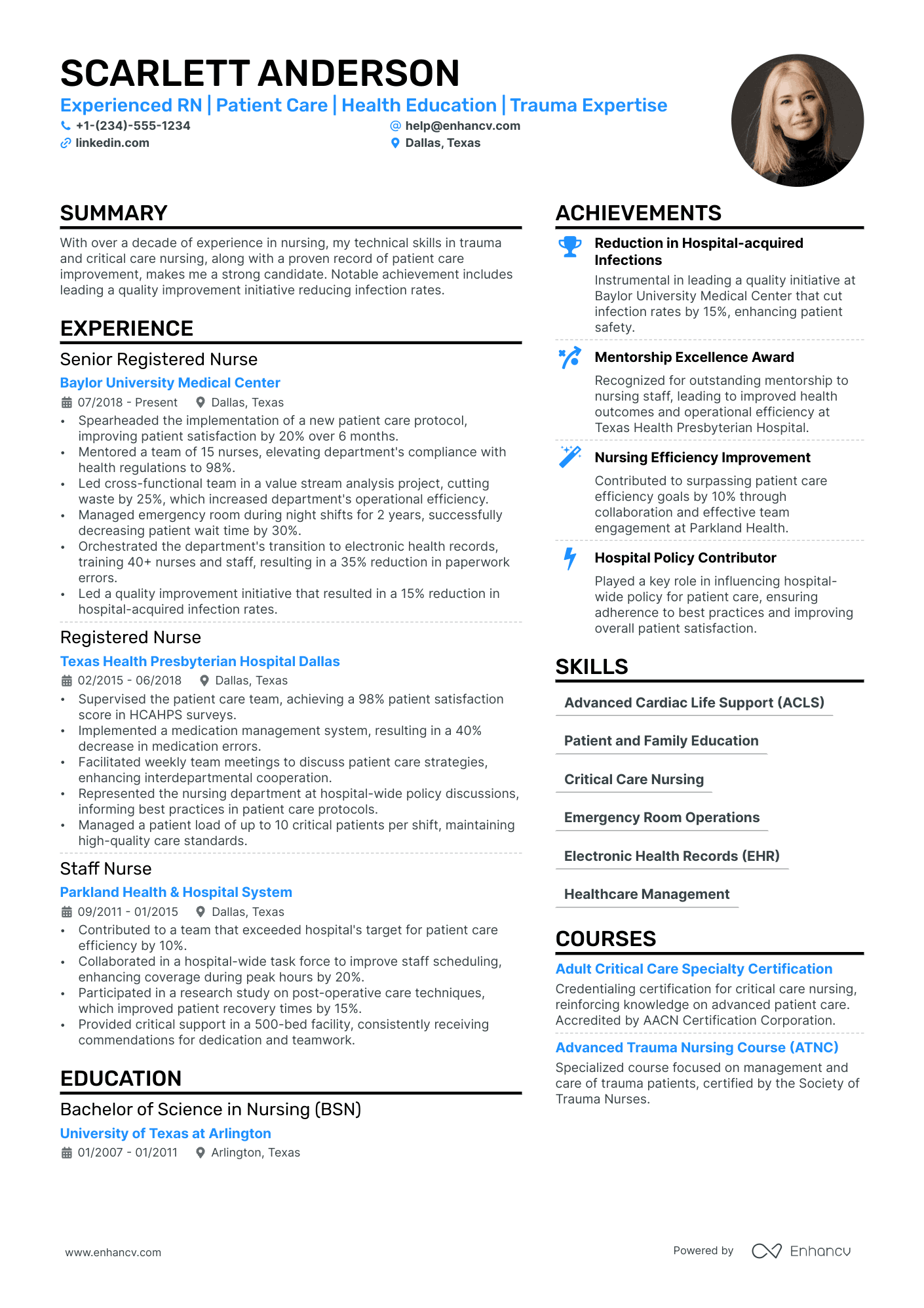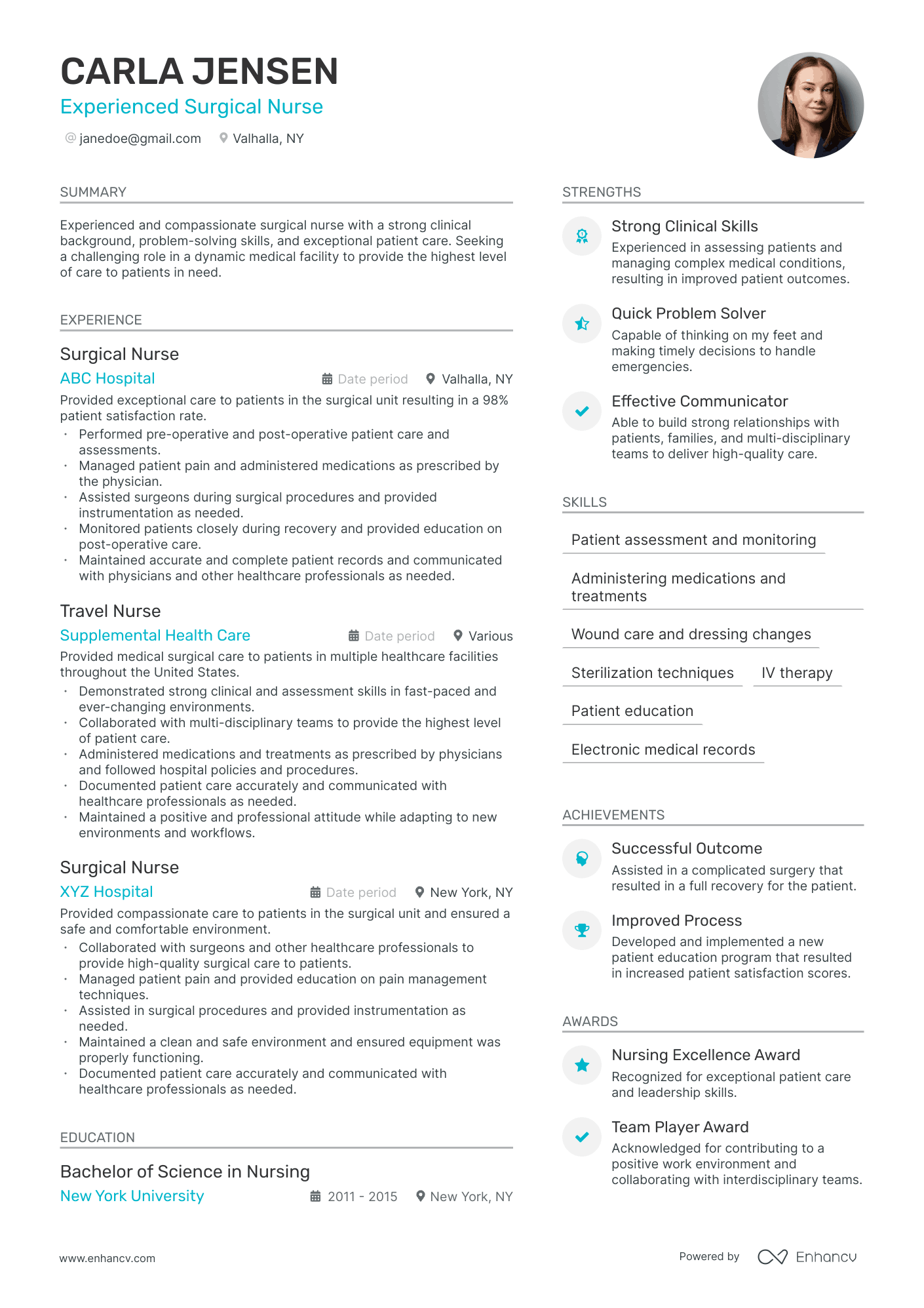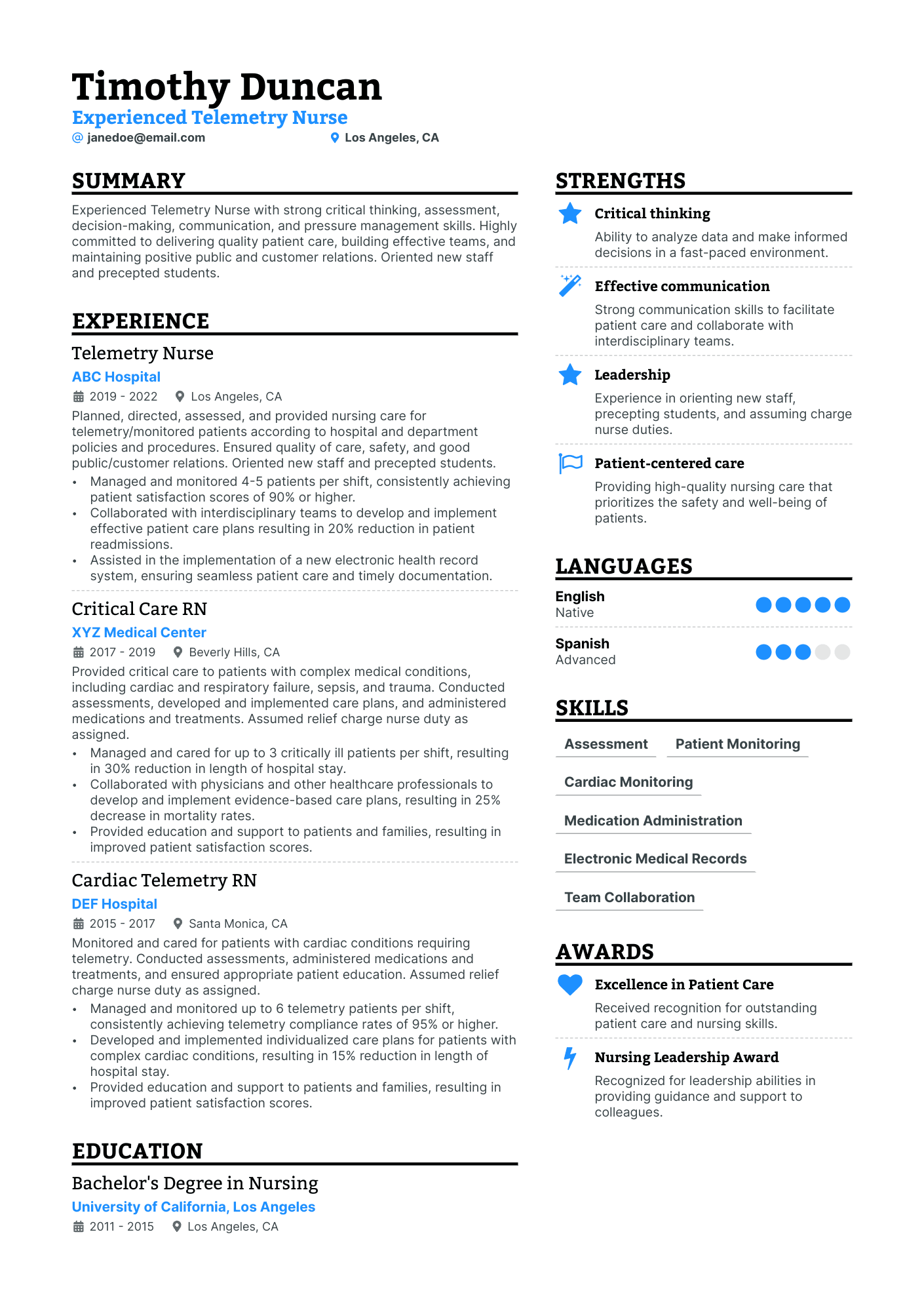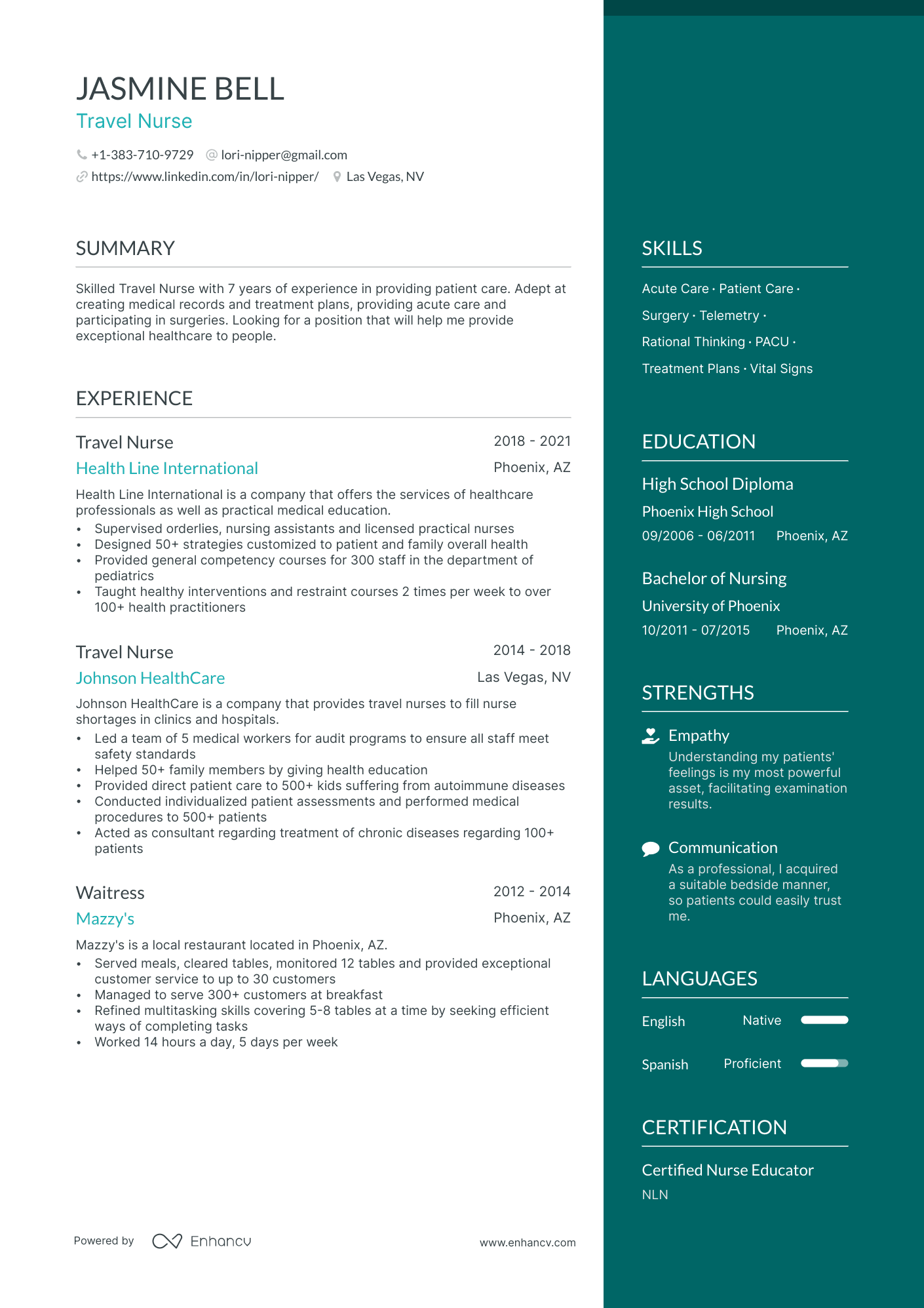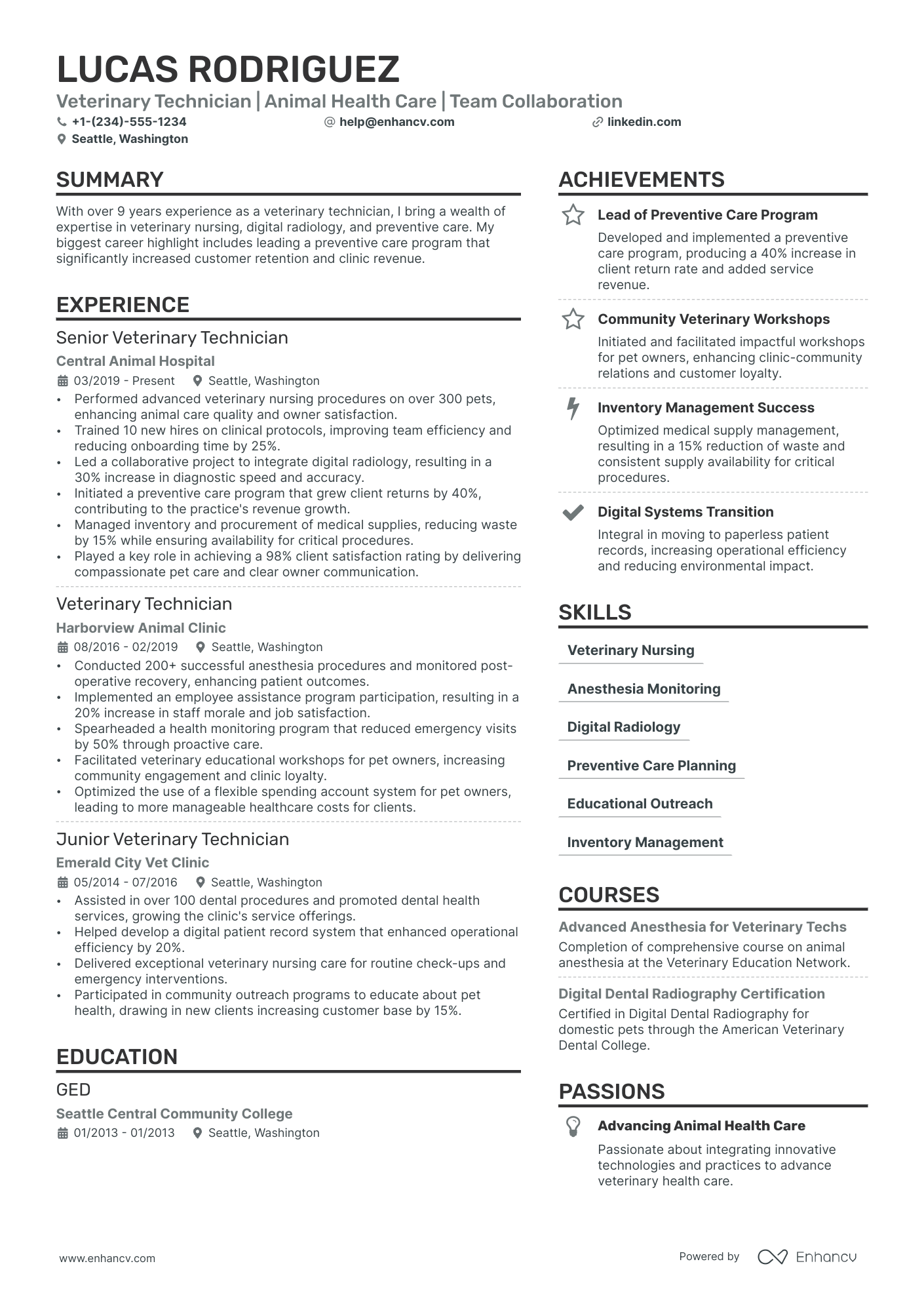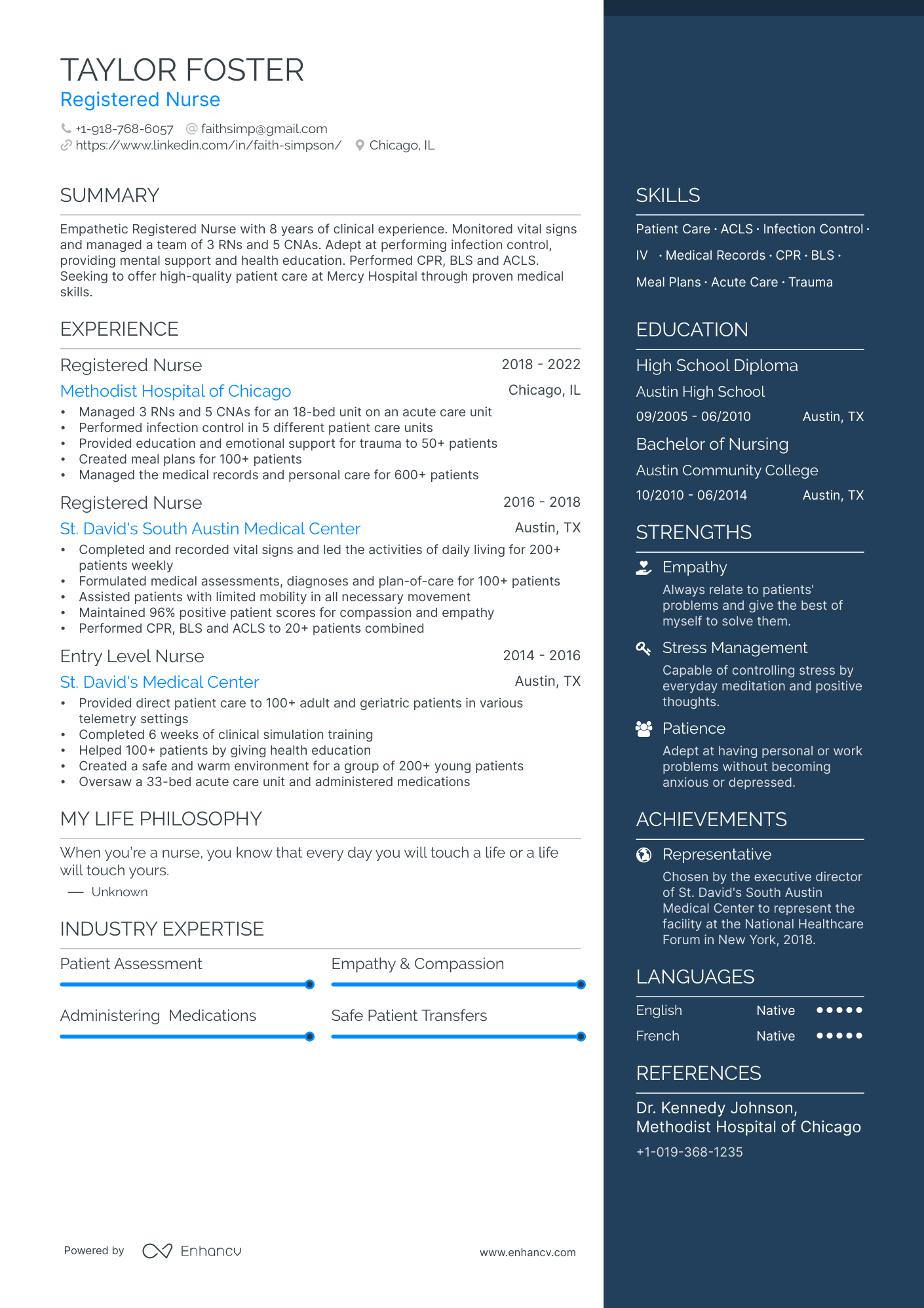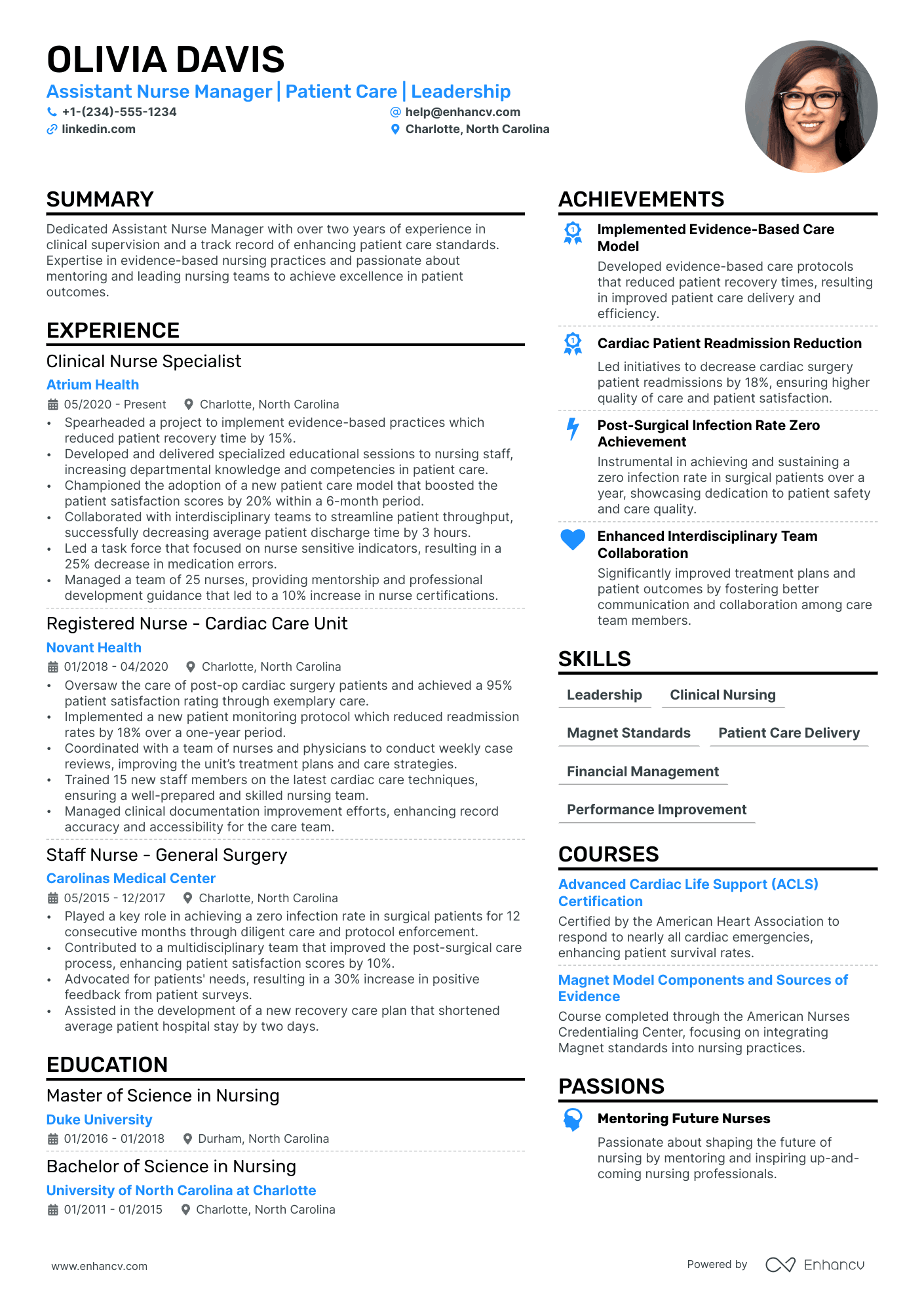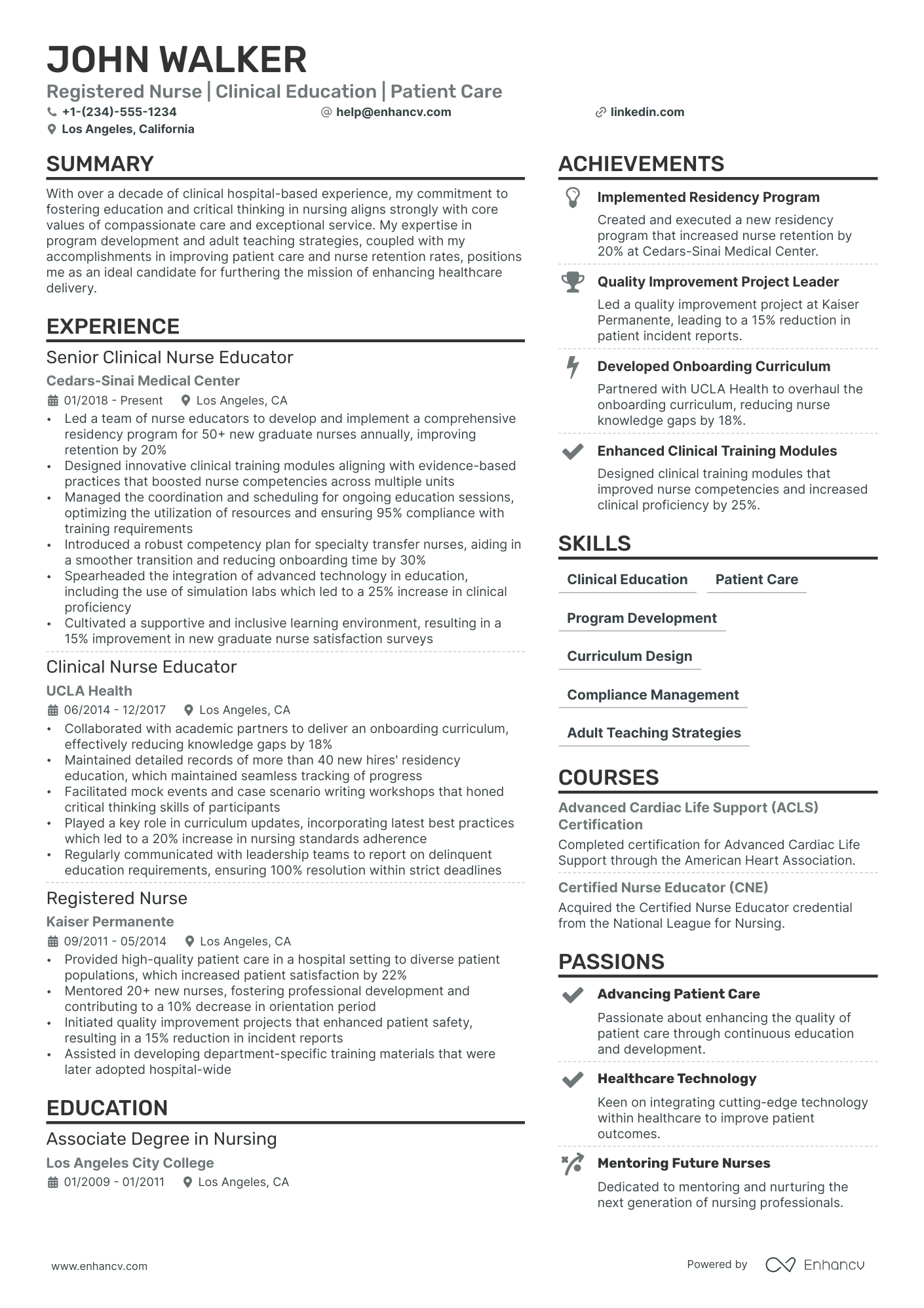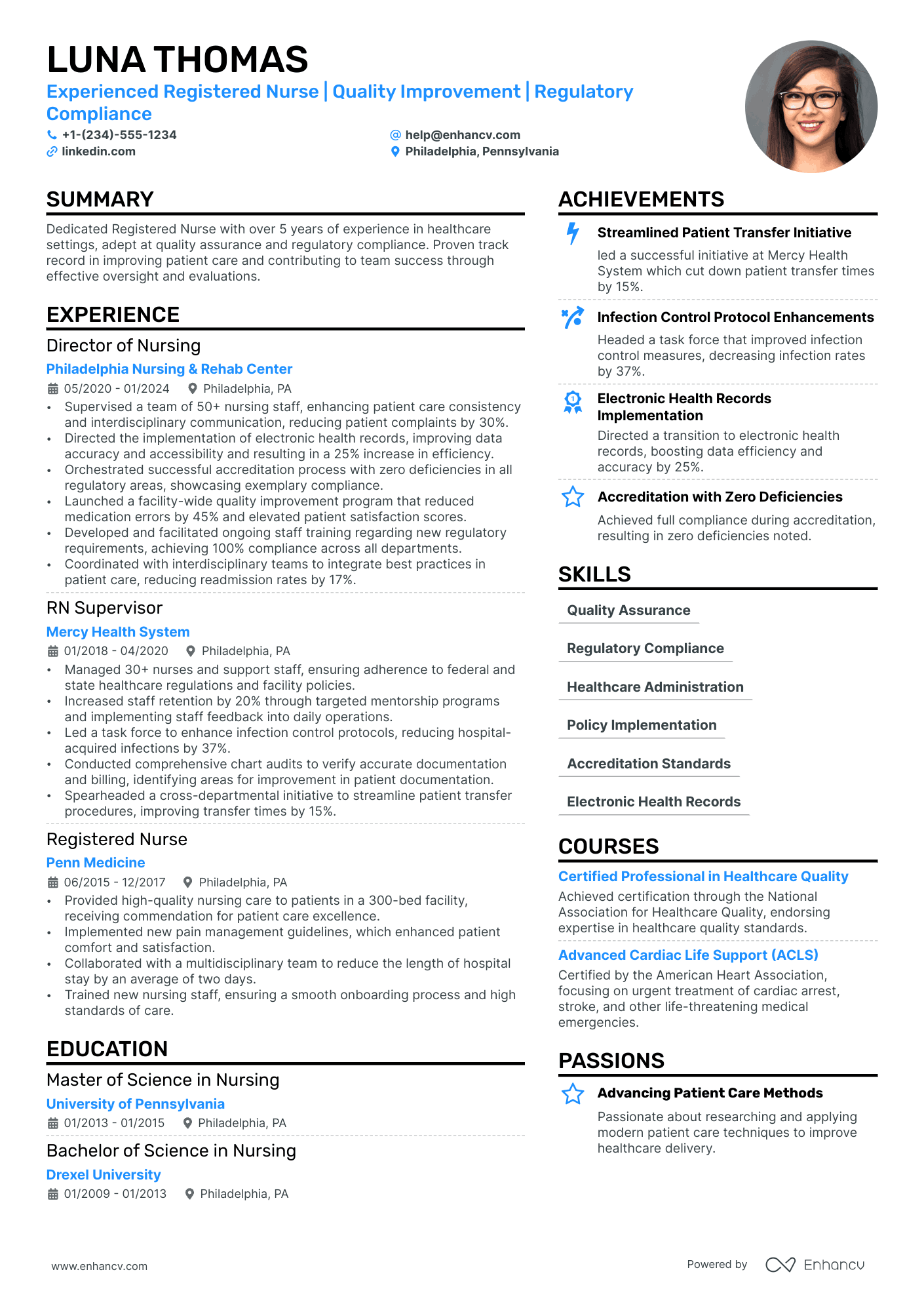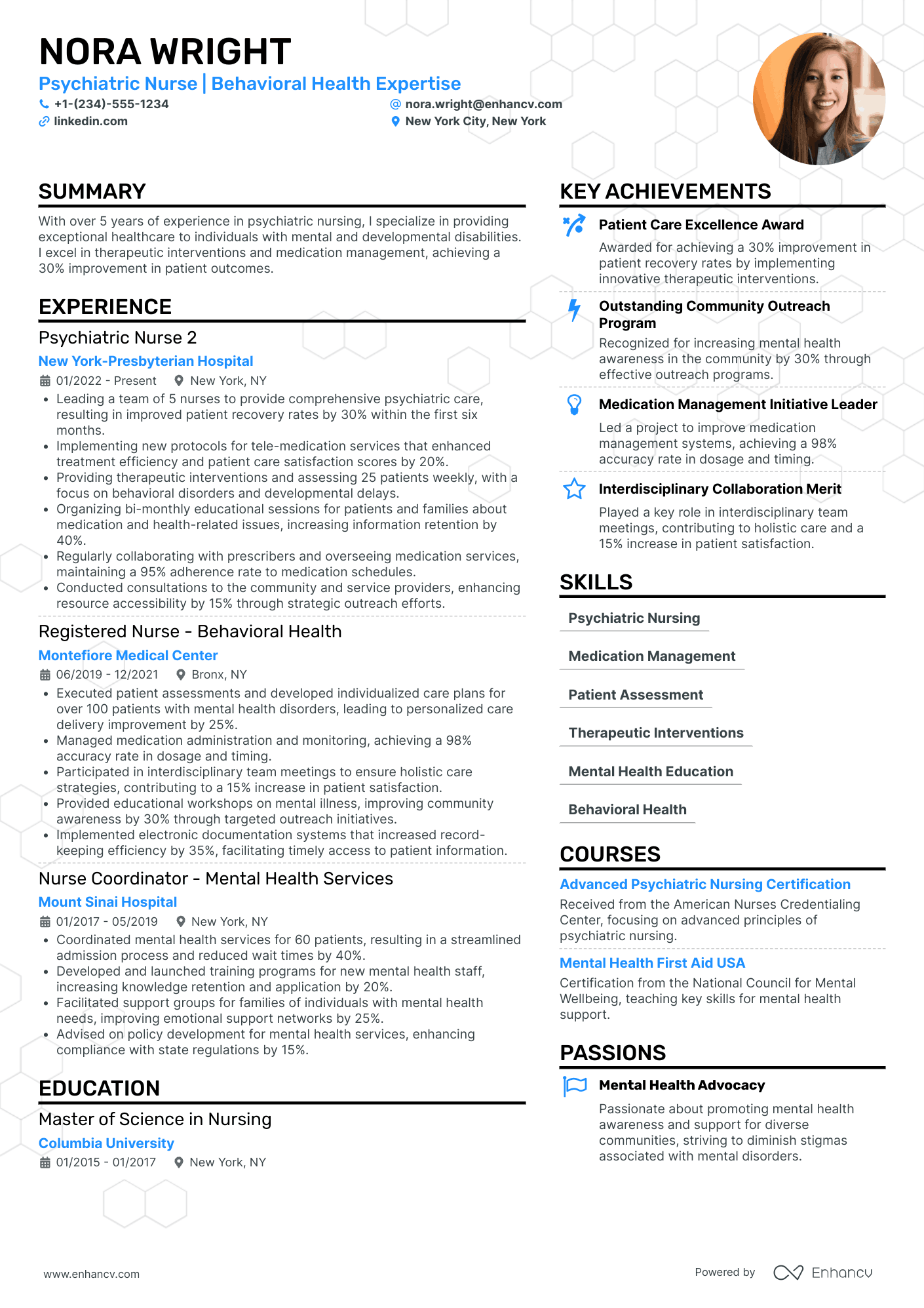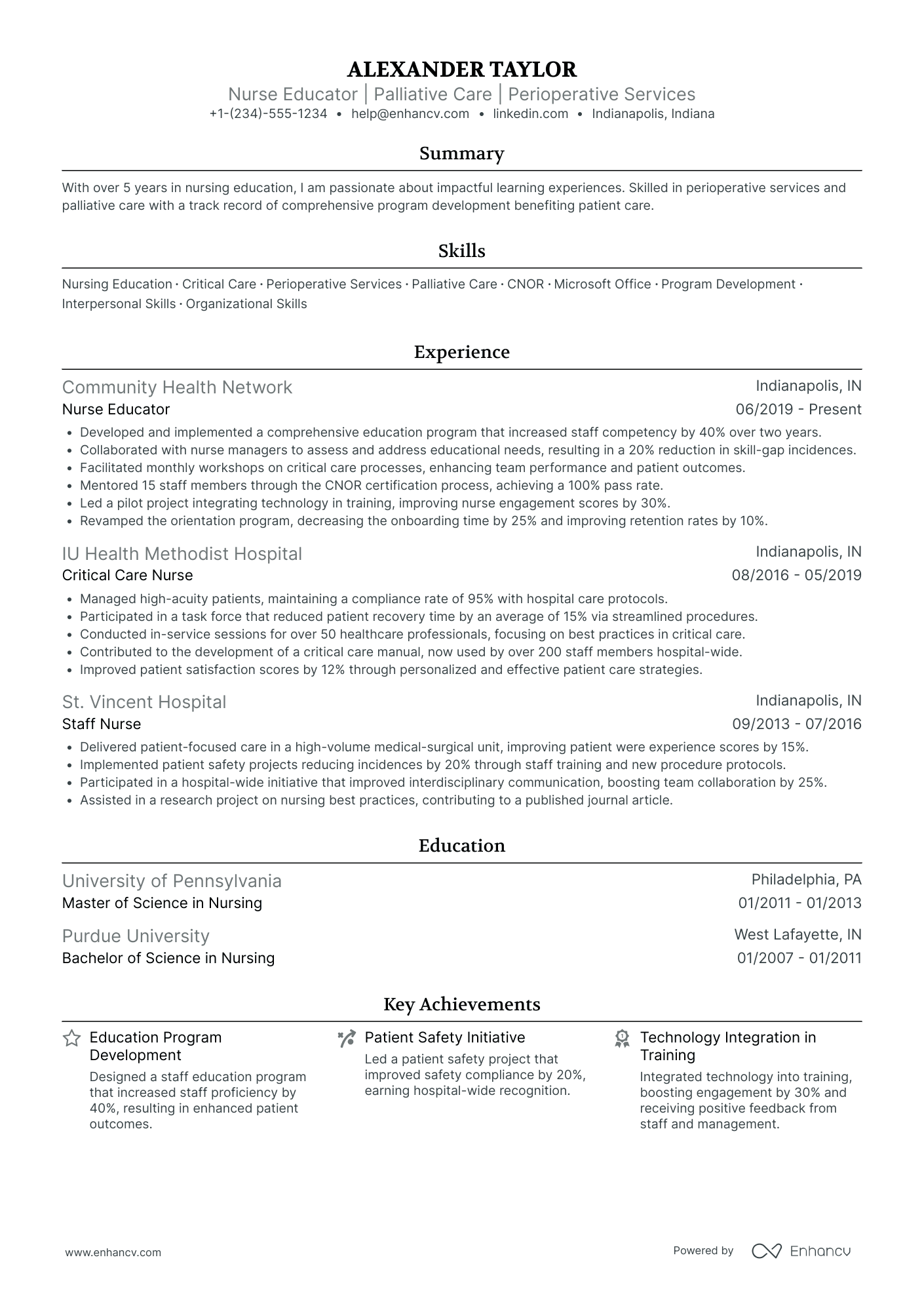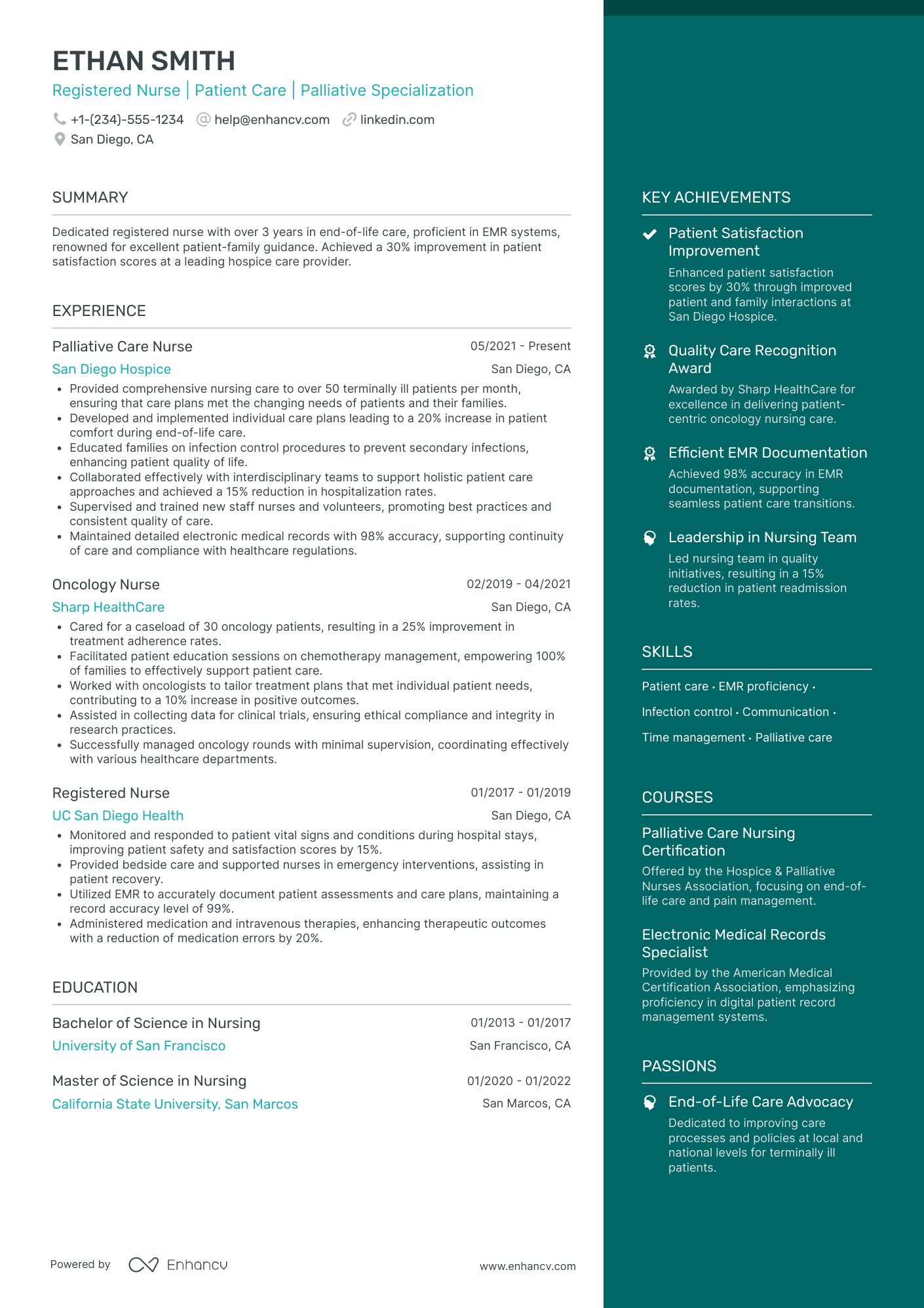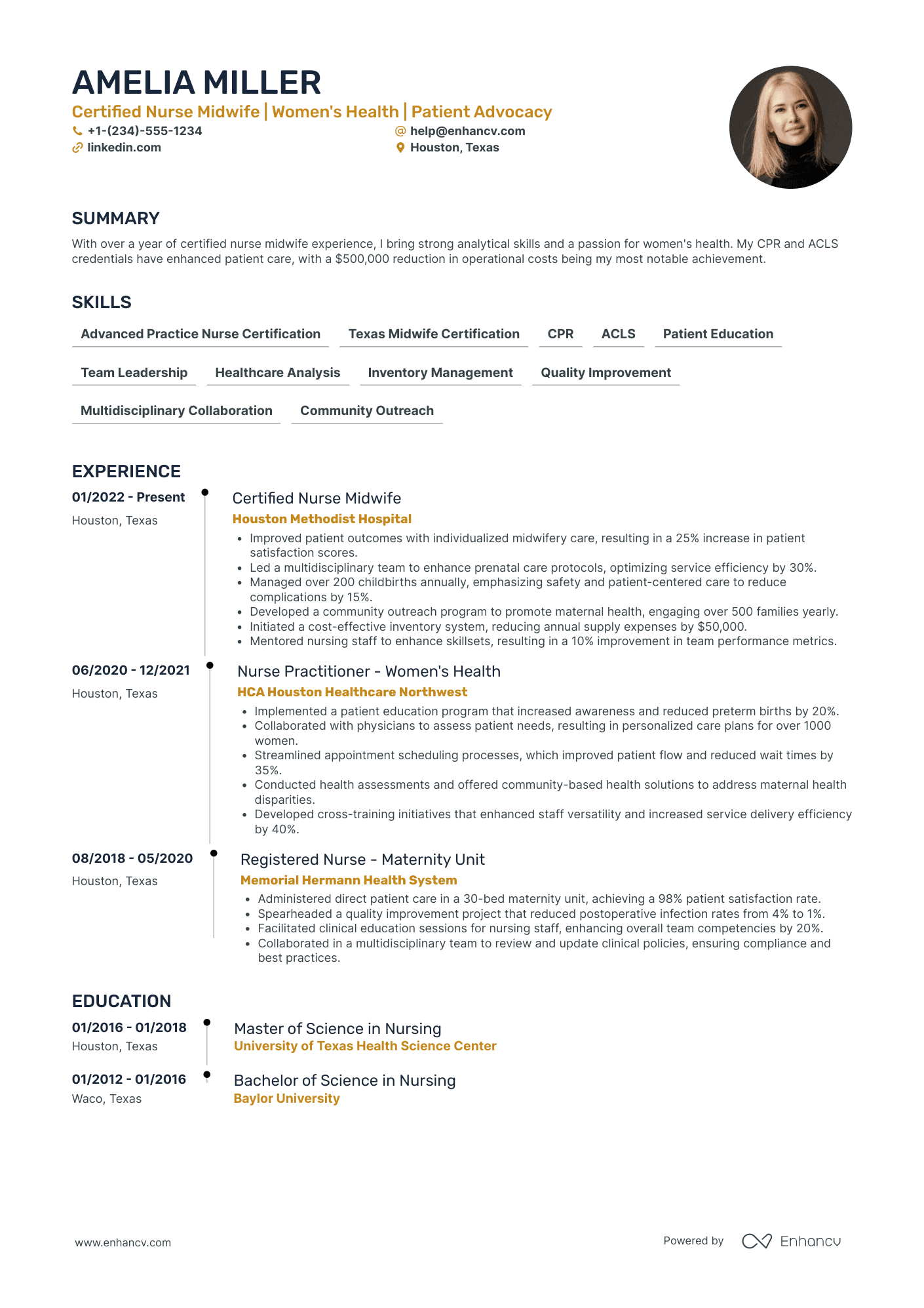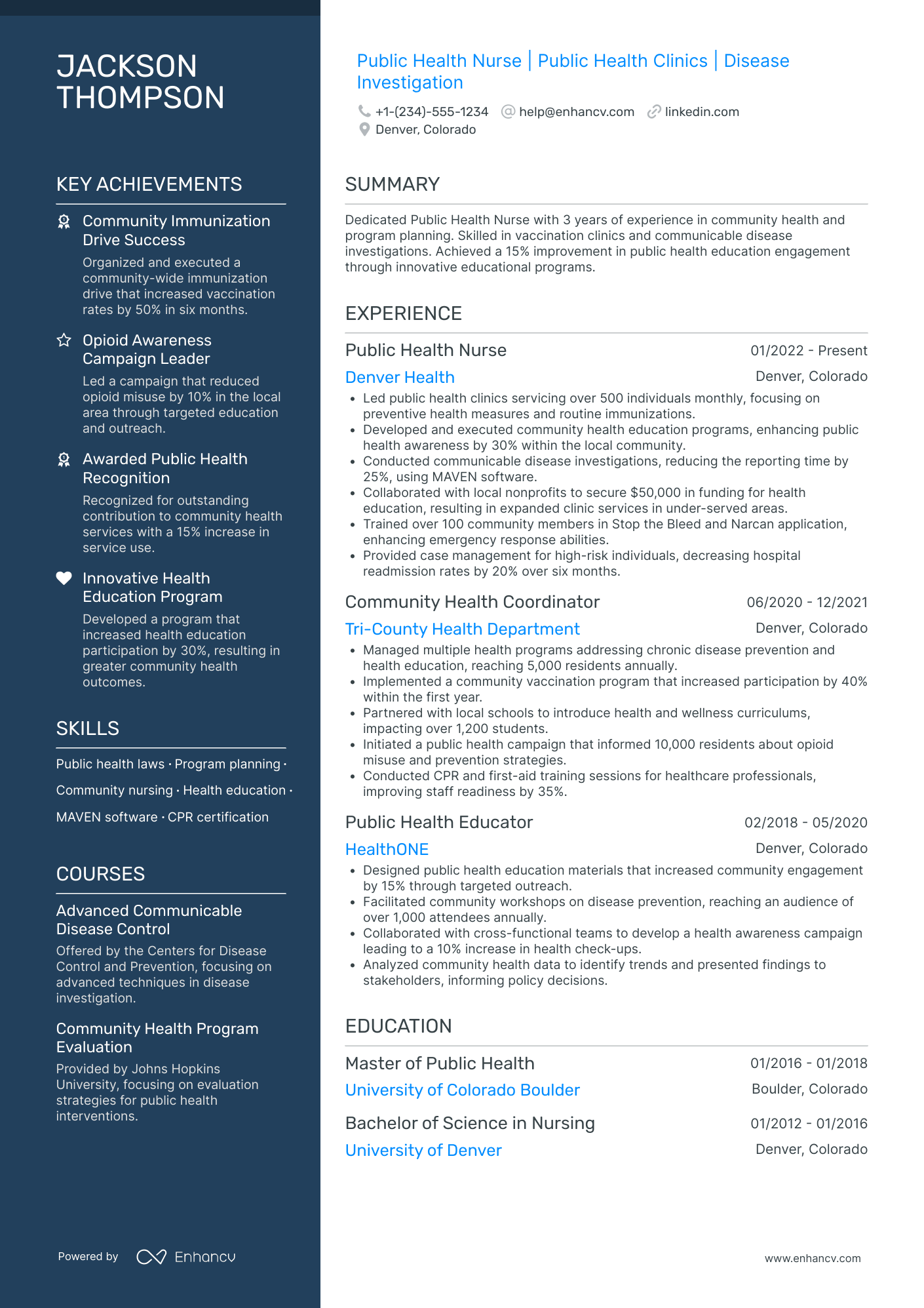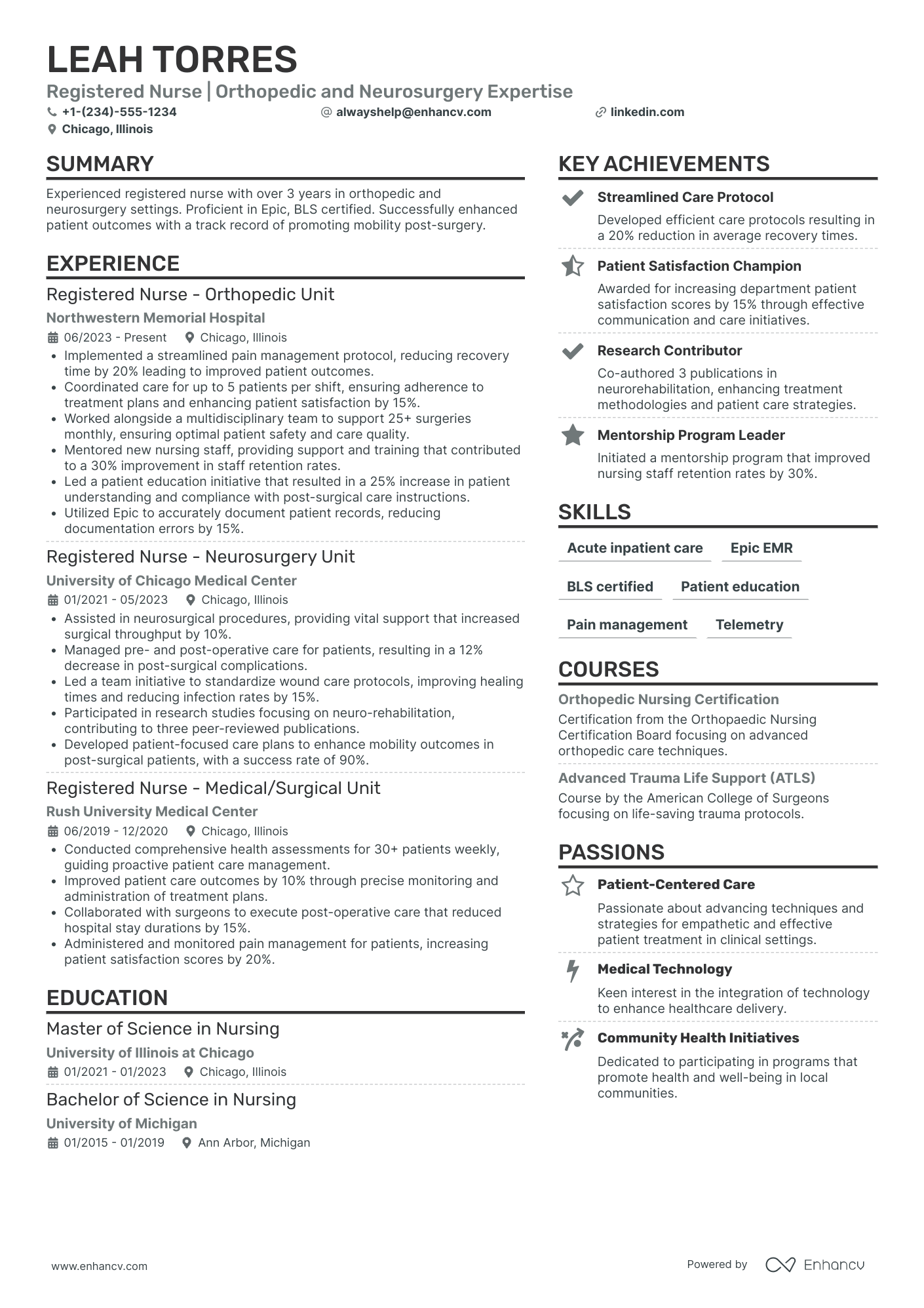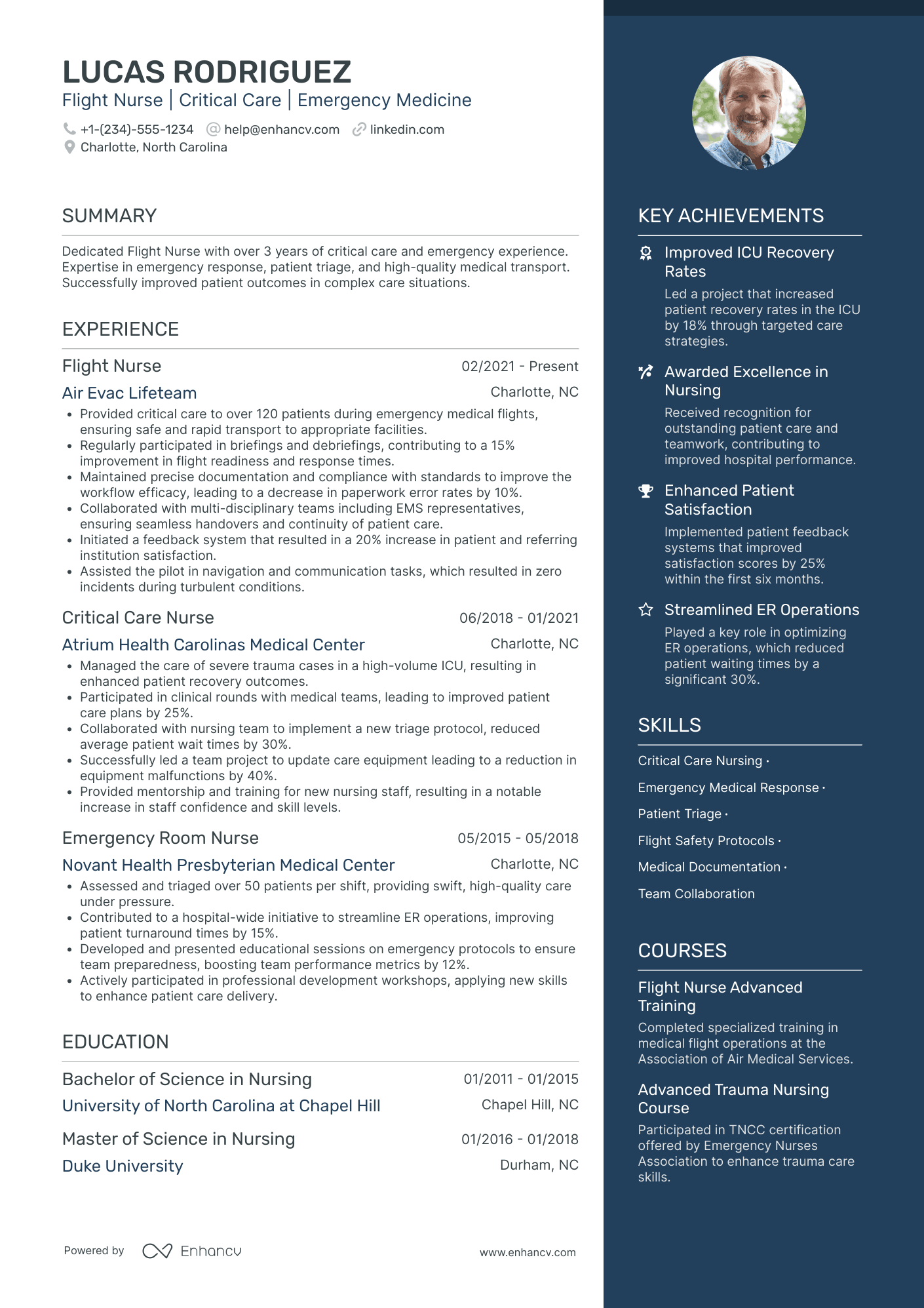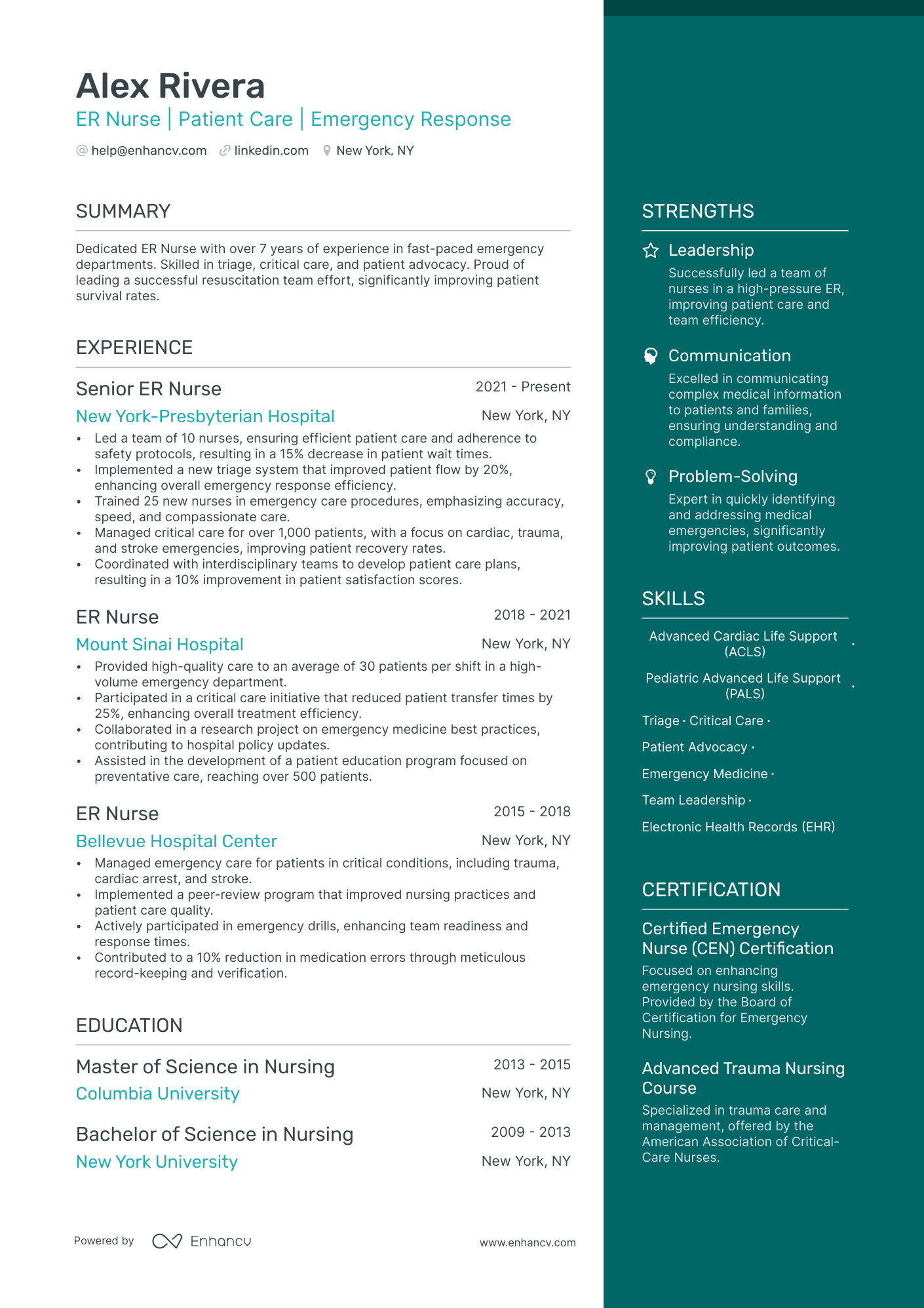Nursing is a noble and fulfilling profession that most enter for the love of providing high-quality, compassionate patient care, rather than to build an impressive resume.
Highlighting professional skills, qualifications, and achievements can be difficult for humble, patient-care focused nurses. However, it’s a crucial first step to secure a position where you can make a meaningful impact on patient’s lives in the competitive healthcare field.
This guide, including examples and protips, aims to simplify the process of transforming your nursing resume from merely a document to a powerful narrative showcasing your expertise and telling the story of your passion for healing that resonates with recruiters.
Nurse resume examples
By Experience
New Grad Nurse
As a new graduate nurse entering the healthcare field, you are expected to apply the knowledge and skills acquired during your nursing education to provide safe and effective patient care. Your resume should showcase your clinical rotations, hands-on experiences in various healthcare settings, and any specialized training, such as Advanced Cardiovascular Life Support (ACLS) certification. Emphasize your ability to work with interdisciplinary teams, adapt to different clinical environments, and contribute to a positive patient experience.
By Role
Nurse Assistant
A nurse assistant plays a vital role in the healthcare setting, providing basic care and support to patients under the supervision of a registered nurse or licensed practical nurse. They are responsible for tasks such as bathing, dressing, feeding, and monitoring vital signs. On a nurse assistant resume, it's essential to demonstrate hands-on experience in these areas and showcase any specialized training, such as completion of a state-approved nurse assistant training program or obtaining a Certified Nursing Assistant (CNA) credential.
Aesthetic Nurse
Agency Nurse
Clinical Nurse
Clinical Research Nurse
Company Nurse
Critical Care Nurse
Dental Nurse
ER Nurse
Hemodialysis Nurse
ICU Nurse
Infection Control Nurse
Licensed Practical Nurse (LPN)
LVN
Medical Surgical Nurse
NICU Nurse
Nurse Anesthetist
Nurse Practitioner
OB Nurse
Occupational Health Nurse
PACU Nurse
Pediatric Nurse
Perioperative Nurse
Practice Nurse
School Nurse
Staff Nurse
Surgical Nurse
Telemetry Nurse
Travel Nurse
Veterinary Nurse
Registered Nurse
Registered nurses (RNs) play a crucial role in the healthcare system, providing comprehensive care to patients in various clinical settings, including hospitals, long-term care facilities, and outpatient clinics. Your RN resume should demonstrate your expertise in assessing patient needs, developing and implementing care plans, and collaborating with interdisciplinary healthcare teams to optimize patient outcomes. Emphasize your ability to administer medications, monitor patient progress, and provide education and support to patients and their families.
Nurse Manager
Nurse managers are experienced nursing professionals who assume leadership roles in healthcare settings, overseeing nursing staff and managing patient care services. Your nurse manager resume should demonstrate your expertise in nursing practice, as well as your ability to lead, motivate, and support a team of nursing professionals. Emphasize your experience in managing clinical operations, developing and implementing policies and procedures, and ensuring compliance with regulatory and accreditation standards.
Nurse Educator
Nurse educators are experienced nursing professionals who play a vital role in preparing the next generation of nurses by teaching, mentoring, and guiding them in academic and clinical settings. Your nurse educator resume should demonstrate your expertise in nursing practice, curriculum development, and instructional design. Emphasize your experience in teaching and evaluating nursing students, developing lesson plans, and coordinating clinical experiences in various healthcare settings.
Staff Nurse
Staff nurses are registered nurses who provide direct patient care across a variety of healthcare settings, including hospitals, long-term care facilities, clinics, and home health agencies. Your staff nurse resume should demonstrate your expertise in assessing patient needs, implementing individualized care plans, and collaborating with interdisciplinary healthcare teams to optimize patient outcomes. Emphasize your ability to administer medications, monitor patient progress, and provide education and support to patients and their families.
Charge Nurse
Psychiatric Nurse
- Clear Focus on Behavioral Health Expertise - The resume opens with a clearly defined professional identity as a Psychiatric Nurse with a specialty in Behavioral Health, immediately signaling the candidate’s area of focus and ensuring relevancy for roles in mental health care.
- Strategic Career Growth and Leadership Roles - Nora Wright's career trajectory highlights a progression from Nurse Coordinator to Psychiatric Nurse 2, with each role demonstrating increased responsibility, leadership, and influence within reputable healthcare institutions such as Mount Sinai, Montefiore, and New York-Presbyterian Hospital.
- Emphasis on Measurable Achievements - The inclusion of specific metrics, such as a 30% improvement in patient outcomes and 95% medication adherence rate, reinforces the candidate's ability to deliver impactful and quantifiable results that align with organizational goals and patient care standards.
Nurse Educator
- Structured and Comprehensive Content Presentation - The resume is effectively organized, providing a clear snapshot of the candidate’s professional journey. Each section is concisely presented, balancing detailed accomplishments with succinct bullet points that enhance readability. This structured approach ensures key information stands out, making it easy for hiring managers to quickly assess the candidate’s qualifications and achievements.
- Distinct Career Trajectory in Nursing Education and Care - Alexander Taylor’s career demonstrates significant growth and specialization within the nursing sector. Progressing from a staff nurse to a nurse educator, the resume illustrates a clear advancement in responsibilities and expertise within palliative care and perioperative services. This upward trajectory highlights both professional development and a deepening focus on educational excellence in healthcare settings.
- Impressive Achievements with Measurable Impact on Patient Care - The resume is notable for its emphasis on achievements that have directly improved patient care and organizational performance. Examples include a 40% increase in staff competency through educational program development and a 20% reduction in skill-gap incidences. These figures demonstrate the candidate’s ability to drive meaningful improvements in healthcare environments, underscoring their effectiveness as both an educator and a practitioner.
Hospice Nurse
- Well-organized content presentation - The resume is clearly structured with distinct sections for experience, education, skills, courses, achievements, languages, and passions, making it easy for the reader to navigate and comprehend Ethan's qualifications and professional journey.
- Comprehensive career trajectory - There is a noticeable progression in Ethan's career from a Registered Nurse to a specialized Palliative Care Nurse, with a clear growth path evident from increasing responsibilities and roles in prestigious healthcare institutions.
- Emphasis on patient-centric achievements - The achievements section highlights Ethan's real-world impact, such as enhancing patient comfort and care outcomes. These accomplishments are not just numbers but reflect substantial improvements in patient satisfaction and healthcare quality, demonstrating his effectiveness and value to employers.
Nurse Midwife
- Concise and Structured Presentation - The resume is well-organized with sections clearly defined for easy navigation. Information is presented concisely, allowing hiring managers to quickly discern Amelia's qualifications, career milestones, and credentials. The structured format makes it simple to follow her career journey and achievements without information overload.
- Demonstrates Strong Leadership and Mentorship - Amelia's resume highlights her leadership capabilities through several initiatives, such as mentoring nursing staff and leading multidisciplinary teams to optimize clinical protocols and enhance team performance. Her focus on mentorship and collaboration showcases her commitment to professional development and her ability to foster a productive working environment.
- Emphasizes Impactful Achievements - The resume effectively illustrates Amelia’s contributions to operational efficiency and patient care through quantifiable achievements. For example, reducing operational costs by $500,000 and cutting supply expenses by $50,000 underline her ability to implement cost-effective solutions that have significant financial and operational impacts within healthcare facilities.
Public Health Nurse
- Structured and Comprehensive Presentation - The resume is well-organized with clearly defined sections that make it easy to navigate through Jackson's professional journey. The use of bullet points provides conciseness and clarity, allowing the reader to quickly grasp key responsibilities and accomplishments.
- Clear Career Progression and Specialization - Jackson's career trajectory reflects a steady growth within the public health field, demonstrating both vertical advancement from a Public Health Educator to a Public Health Nurse and expansion in functions and responsibilities like program planning and disease investigation.
- Industry-Specific Expertise and Tools - Jackson showcases proficiency in crucial public health methodologies and tools, such as MAVEN software used for disease investigations, highlighting a specialized skill set that is critical in public health clinics and disease management.
Orthopedic Nurse
- Clear Structure and Conciseness - Leah Torres' resume is exceptionally well-organized, with each section distinctly categorized, making it easy for readers to quickly identify relevant information. Each bullet point in her experience section is concise and action-oriented, highlighting substantial contributions without unnecessary embellishments.
- Strategic Career Growth - The resume evidences a clear career trajectory, demonstrating Leah’s progression from a role in a Medical/Surgical Unit to specialized expertise in Orthopedic and Neurosurgery units. It exhibits her upward mobility through advanced learning and responsibilities, marking a steady increase in her professional competence.
- Impactful Achievements in Patient Outcomes - Leah's achievements are particularly noteworthy for their direct business relevance and impact, such as reducing recovery times by 20% and improving patient satisfaction scores by 15%. These metrics reflect her ability to contribute significantly to healthcare quality and patient experience.
Flight Nurse
- Well-Structured and Concise Presentation - The resume is effectively organized with clearly defined sections that provide a comprehensive overview without overwhelming the reader. Each section is concise, maintains clarity, and allows for easy navigation through Lucas Rodriguez's career accomplishments and educational background.
- Progressive Career Trajectory - Lucas demonstrates a natural progression within the healthcare industry, moving from an Emergency Room Nurse to a Critical Care Nurse, and advancing to a Flight Nurse role. This trajectory underscores his dedication to expanding his expertise and responsibilities in critical care and emergency medical services.
- Emphasis on Adaptability and Collaboration - The resume highlights Lucas's adaptability through his cross-functional experience with multi-disciplinary teams, showcasing his teamwork skills and ability to collaborate across various healthcare settings, which is crucial for a Flight Nurse role.
How to format a nurse resume
The nursing job market can be quite competitive. That’s why utilizing every aspect of your resume for optimal impact, including formatting, is crucial.
Formatting is your first opportunity to draw attention and make an impression on employers. To ensure your resume is well-organized, professional, and memorable, consider the following formatting best practices:
- Creative Elements - Include creative elements like colors and decorative patterns to make your resume unique and memorable.
- Header Content - A prominent header featuring your name, desired job title, and contact information lets employers know who you are at a glance.
- Ordering - Listing all section examples in reverse chronological order ensures your most recent and, therefore, relevant certifications and experiences appear first.
Understanding the role of Applicant Tracking Systems (ATS) is critical, especially in nursing, where job demands may vary considerably from position to position.
ATS analyzes text on resumes, looking for precise keywords or phrases corresponding to skills and qualifications needed for a particular job. Employers use these systems to quickly sort and prioritize resumes to view the most qualified candidates. ATS-optimized formatting enables ATS to recognize and parse the information on your resume accurately, improving the likelihood it reaches the employer.
Here’s what’s considered “best practices” for ATS-optimized formatting on your resume:
- Fonts - Select ATS-friendly fonts matching the overall style of your resume. Some ATS-friendly fonts are Calibri, Arial, and Times New Roman. However, by employing these overused fonts, you may miss a chance to make your resume stand out. For interesting, modern font options with great readability, try Rubik, Lato, Montserrat, Raleway, Exo 2, or Volkhov, all available on the Enhancv Resume Builder.
- Document Type - Doc or PDF files are typical for resumes and most easily analyzed by ATS.
- Creative Elements in Text - Avoid using nonessential stylistic features within text. Elements such as emojis and non-standard date formats can impede ATS’ ability to recognize information in these sections.
- Headings and Subheadings - Ensure resume sections are logically organized and include simple, precise headings. Standard section titles ensure ATS accurately recognizes and extracts information from these sections.
Different markets have specific resume formats – a Canadian resume could vary in layout.
Is your resume good enough?
Drop your resume here or choose a file. PDF & DOCX only. Max 2MB file size.
To improve the organization and ATS optimization of your resume, include the following top-recommended sections,
The top sections on a nurse's resume:
- Professional Experience: Demonstrates the nurse's clinical skills and healthcare knowledge.
- Education: Highlights relevant nursing education and certifications.
- Licenses and Certifications: Showcases the nurse's qualifications and legal ability to practice.
- Clinical Skills: Details specific medical nursing skills, demonstrating job suitability.
- Awards and Recognitions: Reflects the nurse's excellence and dedication in nursing.
While all nurses have unique backgrounds and qualifications, recruiters specifically seek out candidates that mention particular skills and abilities. Include the following qualifications within your resume sections to ensure your resume gets noticed:
What recruiters want to see on your resume:
- Medical Skills: Recruiters prioritize these skills because they demonstrate a nurse's capacity to effectively handle the health needs of patients and respond appropriately in emergencies.
- Interpersonal Skills: Soft skills like empathy, communication, and patient advocacy are sought after as they are vital in providing quality patient care.
- Certification and Licensure: These are important to hiring managers as they confirm the individual has met the required nursing standards to practice in the state, ensuring patient safety.
- Specific Training or Specialization: Recruiters value these as they demonstrate a nurse's expertise in specific areas of patient care necessary in particular departments or units.
- Clinical Experience: This is prioritized as it provides evidence of a nurse's ability to effectively apply learned skills and knowledge in a practical setting.
How to write your nurse resume experience
The experience section of your nurse resume isn’t just an opportunity to share your previous employment. It’s also an opportunity to share practical clinical experiences and internships. In describing these experiences, you will also share the nursing skills and abilities you developed and your achievements in these positions.
The high demand for nurses and the broad range of required tasks in nursing positions means applicants will come from diverse backgrounds with varying qualifications.
Determining which employment experiences are most relevant to the available position can be challenging.
The best way to demonstrate your experiences align with an available position is to create a targeted experience section.
PRO TIP
To quickly and easily create a targeted nurse resume for individual applications, follow these steps:
- Create a resume template including a complete list of your experiences, certifications, education, and skills.
- Make a copy of the template for each new application.
- Review the job description for each new job you apply to, paying close attention to ideal candidate descriptions.
- In the copy of the template, delete all examples that don't align with the job description.
- Edit remaining examples to ensure they include keywords copied directly from the job description for increased ATS optimization.
A common mistake in the experience section of nurse resumes is detailing duties instead of highlighting skills development and achievements accomplished. Writing detailed descriptions incorporating keywords demonstrates not only what you did but how successfully you did it.
Take a look at the following experience examples to better understand how quality descriptions can boost your resume's experience section.
- •Received recognition for maintaining a high standard of care, with positive patient feedback and acknowledgment from hospital leadership.
- •Acted as a charge nurse.
- •Attended professional development workshops and training sessions.
- •Participated in hospital-wide initiatives, including quality improvement projects.
This example fails to use action verbs and details to describe how their achievements in this position resulted from their efforts. The resulting example comes across as a list of assigned tasks and passive results. And the applicant has missed opportunities to incorporate keywords and accomplishments.
- •Earned 'Nurse of the Month' recognition in Sept. 2022 for maintaining a high standard of care, with positive patient feedback and input from hospital leadership.
- •Acted as a charge nurse, overseeing the coordination of patient care activities, maintaining a positive team environment, and effectively delegating tasks to ensure optimal patient care delivery.
- •Collaborated with a multidisciplinary team to develop and implement hospital-wide initiatives, including quality improvement projects that led to a 15% reduction in patient readmission rates.
- •Engaged in monthly professional development, attending workshops and training sessions to enhance skills and stay current with industry advancements.
Describing what the applicant did and achieved using active verbs significantly improves this experience example. For example, instead of “receiving recognition,” they “earned” a specific award. Additionally, by including the criteria for the award, they incorporated keywords recruiters look for on nursing resumes, such as “high standard of care” and “leadership.” This experience description indicates the applicant achieved a great deal and was highly successful in this position.
How to quantify the impact on your resume
An effective way to boost the impact of your nurse resume is to include quantifiable evidence of your skills in experience descriptions. These are tangible, measurable, or verifiable details that highlight your accomplishments in past jobs.
Sharing a percentage representing significant increases in efficiency or patient satisfaction or a reduction in wait times or adverse outcomes such as medical errors or readmission rates, like the example from the prior section, is an excellent way to quantify the impact.
However, you can quantify your impact in many other ways besides statistics or percentages. Here are a few additional options for using numbers and data to quantify your skills in your experience descriptions:
- Specify how many years of experience you have in similar healthcare settings to quantify your expertise and illustrate suitability for the available position.
- If available, Including high patient satisfaction scores is a practical way to highlight patient care skills and a commitment to providing exceptional care.
- Note the number of medical procedures you have completed to showcase your vast repertoire of practical skills, such as injections or wound dressings.
- The number of emergencies you have handled establishes your capacity to perform under pressure.
- Citing how many medical software or equipment you’re proficient in emphasizes your technical acumen.
- The number of patients typically seen in an office or patient censuses in an average shift demonstrates productivity and efficiency in managing large caseloads.
- If you’ve held a leadership role such as charge nurse, mention the size of the team you coordinated to highlight leadership skills and the ability to manage large teams.
- Stating how many medical training sessions, workshops, and certifications you’ve completed indicates your commitment to professional development and continuing education.
When selecting quantitative data on your resume, remember to be selective by including only the most relevant for the available job. For example, a recruiter hiring for an emergency care facility would be more impressed with your year of experience in emergency care than your knowledge of medical software in a small, private psychiatry office.
How do I write a nurse resume with no experience
…shortages have plagued the nursing profession since 1998.
Projections indicate the need to hire up to a million new nursing professionals by 2024 to meet the growing demand. This is good news for anyone considering becoming a nurse, as they are almost guaranteed placement.
incrediblehealth.com
Ongoing demand for nurses has created numerous opportunities for nursing students and those entering the field. Some employers even offer certification assistance and graduation contingent employment for nursing students. However, competition for these positions may be competitive.
To write a nurse resume that establishes your potential to succeed in a nursing career without experience, follow these steps:
- Compile a list of keywords from the job description.
- Brainstorm previous related experiences showcasing the same keyword skills and knowledge from your list.
Relevant Non-Nursing Employment To Include on your Resume
Non-nursing employment experience in one of these healthcare settings can provide evidence of a background using medical terminology, medical software, patient communication, empathy, and compassion.
- Hospital
- Clinics and Physician's Offices
- Long-Term Care Facilities
- Home Healthcare
- Community Health Centers
- Public Health Organizations
- Research and Clinical Trials
- Telehealth and Telemedicine
- Rehabilitation Centers
- Ambulatory Surgery Centers
- Health Insurance Companies
- Include practical clinical experiences, internships, and volunteer experiences. These can be listed with employment experiences, if closely related to nursing, or incorporated as separate sections.
- Avoid including irrelevant work experiences or outdated experiences.
- To add credibility, include tangible evidence of transferable skills, such as certifications and quantifiable data.
- List experiences in reverse chronological order to ensure your most recent and relevant examples appear first.
PRO TIP
For those without nursing experience, your cover letter is an excellent opportunity to offer further detail about past jobs and describe how skills and knowledge acquired outside the field are transferable to the open job.
Without experience, this section aims to share transferable skills and background knowledge, especially in the medical field. Therefore, your experience section should still be targeted to highlight your potential to succeed in a particular nurse position.
How to list your hard skills and soft skills on your resume
Highly valued skills in nursing may vary greatly depending on factors like the specialty, size and specialty of the medical facility, patient demographics, and number of employees. The skills section of your nurse resume is an opportunity to highlight how your hard and soft skills demonstrate your suitability for a particular job.
For example, an urgent care facility treating high volumes of patients daily will value skills like an expansive repertoire of medical knowledge and procedures and an ability to thrive in fast-paced environments. On the other hand, a small oncology office treating the same patients regularly will appreciate specialized knowledge of oncology terminology and treatments and skills related to compassionate patient care and education.
Hard Skills
The skills necessary to perform a particular job are known as hard skills. These typically require study, training, and practice. In the medical field, they may even require certification.
In nursing, these skills often relate to technical abilities, like using office software and equipment and performing medical procedures, such as taking vitals.
When considering which skills to include on your resume, consult this list of the top hard skills sought by recruiters:
Best hard skills for your nurse resume
- Patient Assessment
- Medical Software (EHR systems)
- Wound Care
- IV Therapy
- Phlebotomy
- Medication Administration
- Vital signs monitoring
- CPR Certified
- Patient Care Planning
- Infection Control
- Emergency Care
- Documentation Skills
- Knowledge of Medical Equipment
- Surgical Assistance
- Clinical Decision Making
- HIPAA Compliance
- Patient Education
- Diabetes Management
- Cardiac Care
- Dialysis Procedures
Soft Skills
Some of the most highly valued skills in nursing are soft skills. The intrinsic, personal skills that demonstrate your ability to provide excellent patient care and satisfaction.
Employers may be willing to train applicants in hard skills. However, the intrinsic nature of soft skills makes them difficult to teach. Therefore, including as many relevant and transferable soft skills as possible on your nurse resume is essential.
These are some of the top soft skills employers look for in nuses:
Best soft skills for your nurse resume
- Empathy
- Communication
- Patience
- Resilience
- Critical Thinking
- Adaptability
- Teamwork
- Time Management
- Leadership
- Attention to Detail
- Stress Management
- Problem-Solving
- Cultural Competency
- Ethics
- Composure under pressure
- Prioritization Skills
- Compassion
- Dedication
- Interpersonal Skills
- Conflict Resolution
Follow these steps to write your nursing resume's skills sections:
- Format your skills section as a simple list without elaboration or examples.
- Differentiate between hard and soft skills by listing them in separate subsections.
- Target your skills section using keyword skills from the job description.
- Write these keyword skills precisely as they appear in the job description to enhance ATS analysis.
- Never lie about or exaggerate your skills on your resume.
- Ensure consistency between your experience and skills sections by listing the skills mentioned in the experience section in the skills section and vice versa.
PRO TIP
Nursing Terminology on Your Resume
Including medical terminologies demonstrates experience in and familiarity with the field, however, excessive jargon or abbreviations can confuse hiring managers who might not have a nursing background. Therefore, you must balance nursing lingo and generally understood terms on your resume.
How to list your certifications and education on your resume
Certifications and Continuing Education are essential for nurses. Though nursing roles and industries have differing requirements.
For example, an RN must complete a nursing education program such as an ADN or BSN, pass the National Council Licensure Examination for Registered nurses (NCLEX-RN), and acquire state licensure.
An LPN doesn't need a degree but must complete a Licensed Practical nurse (LPN) Program, pass the National Council Licensure Examination for Practical nurses (NCLEX-PN), and acquire state licensure.
Detailing all your training and certifications can bog down your resume, making it tough for recruiters to recognize your most valuable qualifications. To prevent this, tailor these sections to each application by sharing only examples aligned to the employer's requirements and reinforcing your targeted skills.
- Follow these steps to write ATS-optimized certification and education sections:
- Create separate sections titled "Education" and "Certifications" to allow ATS to parse information from your resume accurately.
- List all degrees and certifications chronologically, putting your most recent and relevant at the top.
To craft a powerful education section, follow these guidelines:
- For each degree, include the name of the institution, its’ location, the dates attended, and the title of your degree.
- Continuing education coursesrequired for maintaining nurse licensing can be listed in the education section, however, if the section is excessively long, you can separate them into a separate “CE Courses” section as well.
- Including your GPA is optional unless the job description specifies a minimum requirement.
- You can include brief statements about relevant exceptional coursework achievements in the example description.
Here’s an example of how an excellent education example:
- •Online bridge program from RN to MSN
Best practices for listing examples on your resume's certification section:
- Include the name of the certification, the certifying institution, and the year obtained.
- Limit your certifications to those specifically named or directly related to the required skills mentioned in the job description. For example, if you held an LPN certification before becoming an RN, which is no longer valid, you shouldn't list this. The background will be relevant in your experience section, and the certification is implied.
- Limit certifications to current, unexpired credentials.
- If a certification requires renewal to remain valid, include the date first acquired as well as the most recent renewal date or a "valid through" date. For certifications you have held long-term, this demonstrates soft skills such as organization and responsibility.
The following are some of the most highly sought-after certifications for nurses and should be included on your resume whenever relevant.
How to write your nurse resume summary or objective
A summary or objective section, sometimes called “Resume Profiles” or “Personal Statements,” is a powerful tool for contextualizing the data and facts on your resume and how it corresponds to your career progression and goals.
The goal of either a summary or an objective is to briefly clarify how your experiences and qualifications make you a suitable candidate for an available job.
Follow these best practices to write either a summary or an objective:
- Customize the statement to match the specific job you're applying for, emphasizing relevant skills and experiences.
- Start sentences with action verbs to make your summary dynamic and impactful.
- Be brief. A summary should only be 3-5 sentences.
The primary difference between a summary and an objective is that a summary statement focuses on how your employment experience aligns with an available job. In contrast, an objective statement concentrates on your future career goals to illustrate how they correspond with the position.
A summary is preferable for nurses with extensive experience well aligned to the available job, for example, in the same nursing specialty. It highlights how your past successes indicate your potential to succeed in that particular role.
To write a summary for your nurse resume, follow these best practices:
- Highlight your most relevant skills or experiences that directly overlap with the job description.
- Briefly mention your years of experience to provide context for your level of expertise.
- Write an impactful summary using keywords directly from the job description, highlighting your well-aligned keyword experiences and skills.
- Use details such as naming specific software, medical equipment, procedures, and certifications to reinforce the relevance of your experiences.
- Convey your enthusiasm for the opportunity to continue providing high-quality patient care in the medical field in this position.
A common mistake on nurse resumes is to write a personal statement that is too general for a specialty nursing role. Check out how the following summary is improved by targeting it to critical care nursing.
This well-written summary provides quality information. However, the highlighted skills and experience are too general. If the term "critical care" were removed from the first sentence, this statement could apply to almost any nursing position, failing to target skills valued in critical care. As a result, the applicant misses many opportunities to incorporate key terms and demonstrate that their experiences are valuable in a critical care setting.
This summary does a much better job of focusing on highly valued skills in a critical care environment, such as speed, accuracy, reacting in high-pressure situations, and providing compassionate care.
An objective section is better suited for nurses with limited experience in similar positions or applying for their first job. It allows you to focus on how you plan to use your background to achieve career goals while contributing to the success of the medical team.
To write your nurse resume objective, follow these best practices:
- Describe the type of position you are seeking.
- Share relevant or transferable skills that will help you succeed in the position using keywords directly from the job description.
- Clearly state your career goals and enthusiasm to work towards them in the role.
- Highlight valuable contributions you can make while learning and gaining experience.
- Avoid generic phrases. Instead, focus on specific skills and goals that set you apart.
PRO TIP
Rephrasing specifics from the “Qualifications” or “Ideal Candidate” sections of a job description is a great way to guarantee you mention the skills and qualifications most valued by the employer.
Additional sections for a nurse resume
In addition to the top-resume sections, including one or more of these additional resume sections highlights qualifications or accomplishments and helps you stand out among the other applicants.
- Languages: Excellent patient communication is a cornerstone of the healthcare industry. Therefore, being multilingual is a valuable asset in nursing. Including a language section is an effective way to set yourself apart from other applicants.
- Volunteer Experience: Include healthcare-related volunteer work or community service to demonstrate a commitment to giving back and supporting the community.
- Leadership Experience: To demonstrate extensive experience leading teams and initiatives, share your past leadership roles, such as charge nurse, preceptor, or committee member.
- Achievements and Awards: If you’ve received recognition in your nursing education or work in the past, consider including an awards and achievements section to support your stated skills. In addition to individual awards, you can include awards your office or team received, such as being voted the top healthcare facility in your community.
- Passion: If you have a personal experience that drives and motivates you as a nurse, sharing it establishes your passion for and dedication to nursing excellence. For example, a childhood battle with cancer that led you to oncology or losing a loved one in an accident that motivated you to specialize in emergency medicine.
- Professional Associations: A professional Associations section highlights your dedication to ongoing improvement and staying current in nursing. If you’d like to include a professional association membership to your resume, consider joining one of the leading professional associations for nurses below.
How to write a nurse specialization section:
Nursing is a broad field with many specializations, such as pediatric, surgical, and psychiatric nursing. If you have extensive experience or certification in a particular medical specialty that directly corresponds to the position you're applying for, consider including a specialization section to highlight your qualifications.
Include the following in your nurse specialization section should include the following:
- The title of your nurse specialization
- Specialty-specific employment experience
- Specialty-specific education or certifications
- Valuable Hard skills in the specialization, including technical skills such as using emergency equipment and technologies, including defibrillators, cardiac monitors, and infusion pumps as an ER nurse
- Knowledge and experience of typical medical procedures and equipment used in the specialty
- Relevant soft skills. For instance, child-friendly communication and patience in pediatric nursing.
Here is an example of how your specialization section should appear on your nurse resume:
While a specialization section demonstrates knowledge, skills, and qualifications, it should only be included as a unique section if applying to a nurse job in a particular specialty. For instance, the above example would be relevant only for employment in a cardiac care position. Otherwise, this information may be incorporated into other resume sections, such as the experience section, to demonstrate your capacity to master specialized skills.
Key takeaways
Organizing the extensive skills and qualifications necessary in nursing is one of the most challenging aspects of writing a nurse resume. Review these key takeaways to ensure your most valuable, unique skills, experiences, and qualifications are accurately reflected on your resume:
- Targeted resumes include only experiences and skills relevant to an available position as found in the job description.
- ATS-optimized formatting helps ensure your nurse resume reaches employers for review.
- Providing quantifiable evidence of achievements in your nursing experience demonstrates your impact in past jobs.
- Include education and certifications required for nursing jobs in reverse chronological order to ensure your most recent and relevant appear first.
- Give context to the information on your resume by including either a summary or an objective section, depending on your experience in similar nursing positions.
- Include a specialization section to highlight your background and expertise in the available nursing position in the same specialty.
